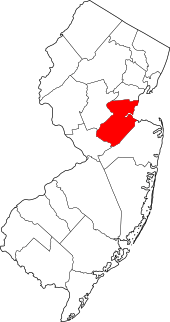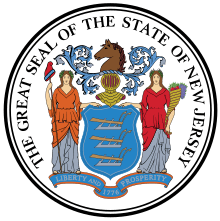New Brunswick, New Jersey
New Brunswick is a city in Middlesex County, New Jersey, United States, in the New York metropolitan area. The city is the county seat of Middlesex County,[21] and the home of Rutgers University. New Brunswick is on the Northeast Corridor rail line, 27 miles (43 km) southwest of Manhattan, on the southern bank of the Raritan River.
New Brunswick, New Jersey | |
|---|---|
| City of New Brunswick | |
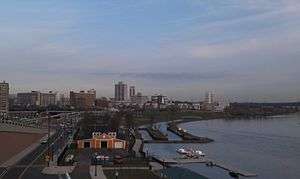 Along the Raritan | |
| Nickname(s): Hub City, Healthcare City | |
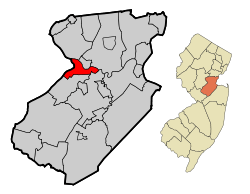 Location within Middlesex County
| |
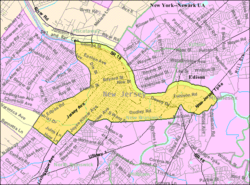 Census Bureau map of New Brunswick, New Jersey | |
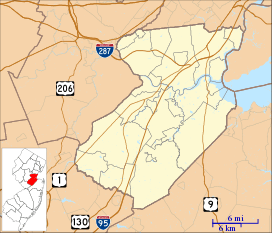 New Brunswick Location in Middlesex County 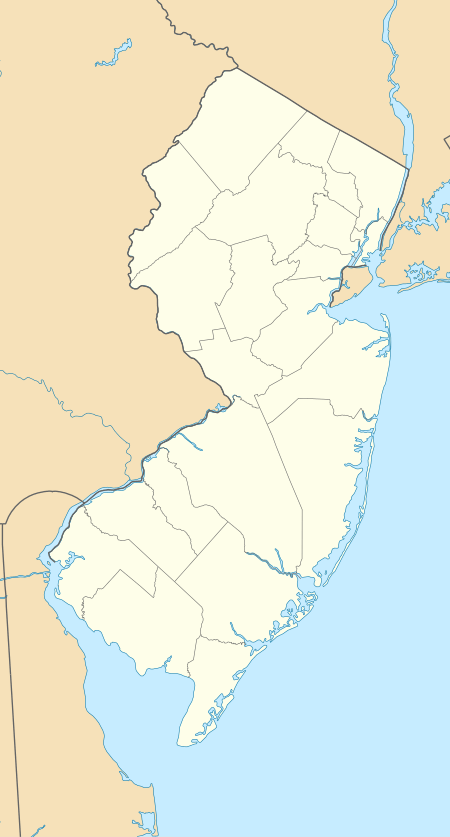 New Brunswick Location in New Jersey  New Brunswick Location in the United States | |
| Coordinates: 40.486678°N 74.444414°W[1][2] | |
| Country | |
| State | |
| County | Middlesex |
| Established | December 30, 1730 |
| Incorporated | September 1, 1784 |
| Named for | Braunschweig, Germany or King George II of Great Britain |
| Government | |
| • Type | Faulkner Act (Mayor-Council) |
| • Body | City Council |
| • Mayor | James M. Cahill (D, term ends December 31, 2022)[4][5] |
| • Administrator | Daniel A. Torrisi[6] |
| • Municipal clerk | Leslie Zeledón[7] |
| Area | |
| • Total | 5.75 sq mi (14.90 km2) |
| • Land | 5.23 sq mi (13.55 km2) |
| • Water | 0.52 sq mi (1.35 km2) 9.06% |
| Area rank | 264th of 565 in state 14th of 25 in county[1] |
| Elevation | 62 ft (19 m) |
| Population | |
| • Total | 55,181 |
| • Estimate (2019)[12] | 55,676 |
| • Rank | 27th of 566 in state 5th of 25 in county[13] |
| • Density | 10,556.4/sq mi (4,075.8/km2) |
| • Density rank | 34th of 566 in state 2nd of 25 in county[13] |
| Time zone | UTC−05:00 (Eastern (EST)) |
| • Summer (DST) | UTC−04:00 (Eastern (EDT)) |
| ZIP Codes | |
| Area code(s) | 732/848 and 908[16] |
| FIPS code | 3402351210[1][17][18] |
| GNIS feature ID | 0885318[1][19] |
| Website | www |
| New Brunswick is the county seat for Middlesex County. | |
— Alfred E. Smith to Lew Dockstader in December 1923 on Dockstader's fall at what is now the State Theater.[20]
For 2019, New Brunswick had a Census-estimated population of 55,676,[12] representing a 0.9% increase from the 55,181 people enumerated at the 2010 United States Census,[9][10][11] which in turn had reflected an increase of 6,608 (+13.6%) from the 48,573 counted in the 2000 Census.[22] Due to the concentration of medical facilities in the area, including Robert Wood Johnson University Hospital and Saint Peter's University Hospital, as well as Rutgers, The State University of New Jersey's Robert Wood Johnson Medical School, New Brunswick is known as both the Hub City and the Healthcare City.[23][24] The corporate headquarters and production facilities of several global pharmaceutical companies are situated in the city, including Johnson & Johnson and Bristol-Myers Squibb.
New Brunswick is noted for its ethnic diversity. At one time, one quarter of the Hungarian population of New Jersey resided in the city and in the 1930s one out of three city residents was Hungarian.[25] The Hungarian community continues as a cohesive community, with the 3,200 Hungarian residents accounting for 8% of the population of New Brunswick in 1992.[26] Growing Asian and Hispanic communities have developed around French Street near Robert Wood Johnson University Hospital.
History
Origins of the name
The area around present-day New Brunswick was first inhabited by the Lenape Native Americans; their Minisink Trail intersected the Raritan River and followed a route that would be taken by later colonial roads.[27] The first European settlement at the site of New Brunswick was made in 1681. The settlement here was called Prigmore's Swamp (1681–1697), then known as Inian's Ferry (1691–1714).[28] In 1714, the settlement was given the name New Brunswick, after the city of Braunschweig (called Brunswick in the Low German language), in state of Lower Saxony, in Germany. Braunschweig was an influential and powerful city in the Hanseatic League and was an administrative seat for the Duchy of Hanover. Shortly after the first settlement of New Brunswick in colonial New Jersey, George, Duke of Brunswick-Lüneburg and Elector of Hanover, became King George I of Great Britain. Alternatively, the city gets its name from King George II of Great Britain, the Duke of Brunswick-Lüneburg.[29][30]
During the Colonial and Early American periods
Centrally located between New York City and Philadelphia along an early thoroughfare known as the King's Highway and situated along the Raritan River, New Brunswick became an important hub for Colonial travelers and traders. New Brunswick was incorporated as a town in 1736 and chartered as a city in 1784.[31] It was incorporated into a town in 1798 as part of the Township Act of 1798. It was occupied by the British in the winter of 1776–1777 during the Revolutionary War.[32]
The Declaration of Independence received one of its first public readings, by Colonel John Neilson in New Brunswick on July 9, 1776, in the days following its promulgation by the Continental Congress.[33][34][35] A bronze statue marking the event was dedicated on July 9, 2017, in Monument Square, in front of the Heldrich Hotel.[36]
The Trustees of Queen's College (now Rutgers University), founded in 1766, voted by a margin of ten to seven in 1771 to locate the young college in New Brunswick, selecting the city over Hackensack, in Bergen County, New Jersey.[37] Classes began in 1771 with one instructor, one sophomore, Matthew Leydt, and several freshmen at a tavern called the 'Sign of the Red Lion' on the corner of Albany and Neilson Streets (now the grounds of the Johnson & Johnson corporate headquarters); Leydt would become the university's first graduate in 1774, when he was the only member of the graduating class.[38] The Sign of the Red Lion was purchased on behalf of Queens College in 1771, and later sold to the estate of Jacob Rutsen Hardenbergh in 1791.[39] Classes were held through the American Revolution in various taverns and boarding houses, and at a building known as College Hall on George Street, until Old Queens was completed and opened in 1811.[40][41] It remains the oldest building on the Rutgers University campus.[42] The Queen's College Grammar School (now Rutgers Preparatory School) was established also in 1766, and shared facilities with the College until 1830, when it located in a building (now known as Alexander Johnston Hall) across College Avenue from Old Queens.[43] After Rutgers University became the state university of New Jersey in 1945,[44] the Trustees of Rutgers divested itself of Rutgers Preparatory School, which relocated in 1957 to an estate purchased from the Colgate-Palmolive Company in Franklin Township in neighboring Somerset County.[45]
The New Brunswick Theological Seminary, founded in 1784 in New York, moved to New Brunswick in 1810, sharing its quarters with the fledgling Queen's College. (Queen's closed from 1810 to 1825 due to financial problems, and reopened in 1825 as Rutgers College.)[46] The Seminary, due to overcrowding and differences over the mission of Rutgers College as a secular institution, moved to a tract of land covering 7 acres (2.8 ha) located less than 1⁄2 mile (0.80 km) to the west, which it still occupies, although the land is now in the middle of Rutgers University's College Avenue Campus.[47]
New Brunswick was formed by royal charter on December 30, 1730, within other townships in Middlesex and Somerset counties and was reformed by royal charter with the same boundaries on February 12, 1763, at which time it was divided into north and south wards. New Brunswick was incorporated as a city by an act of the New Jersey Legislature on September 1, 1784.[31]
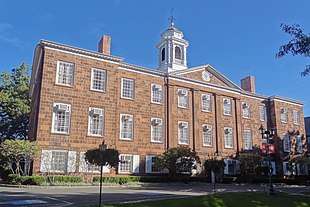 Old Queens, the oldest building at Rutgers University
Old Queens, the oldest building at Rutgers University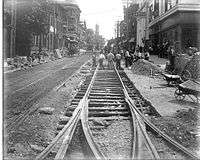 Building the Streetcar line, around 1885
Building the Streetcar line, around 1885.jpeg) Albany Street Bridge, 1903
Albany Street Bridge, 1903.png) Aerial view of New Brunswick, 1910
Aerial view of New Brunswick, 1910
African-American community
Slavery in New Brunswick
The existence of an African American community in New Brunswick dates back to the 18th century, when racial slavery was a part of life in the city and the surrounding area. Local slaveholders routinely bought and sold African American children, women, and men in New Brunswick in the late-eighteenth and early-nineteenth century. In this period, the Market-House was the center of commercial life in the city. It was located at the corner of Hiram Street and Queen Street (now Neilson Street) adjacent to the Raritan Wharf. The site was a place where residents of New Brunswick sold and traded their goods which made it an integral part of the city's economy. The Market-House also served as a site for regular slave auctions and sales.[48]:101
By the late-eighteenth century, New Brunswick became a hub for newspaper production and distribution. The Fredonian, a popular newspaper, was located less than a block away from the aforementioned Market-House and helped facilitate commercial transactions. A prominent part of the local newspapers were sections dedicated to private owners who would advertise their slaves for sale. The trend of advertising slave sales in newspapers shows that the New Brunswick residents typically preferred selling and buying slaves privately and individually rather than in large groups.[48]:103 The majority of individual advertisements were for female slaves, and their average age at the time of the sale was 20 years old, which was considered the prime age for childbearing. Slave owners would get the most profit from the women who fit into this category because these women had the potential to reproduce another generation of enslaved workers. Additionally, in the urban environment of New Brunswick, there was a high demand for domestic labor, and female workers were preferred for cooking and housework tasks.[48]:107
The New Jersey Legislature passed An Act for the Gradual Abolition of Slavery in 1804.[49] Under the provisions of this law, children born to enslaved women after July 4, 1804, would serve their master for a term of 21 years (for girls) or a term of 25 years (for boys), and after this term, they would gain their freedom. However, all individuals who were enslaved before July 4, 1804, would continue to be slaves for life and would never attain freedom under this law. New Brunswick continued to be home to enslaved African Americans alongside a growing community of free people of color. The 1810 United States Census listed 53 free Blacks and 164 slaves in New Brunswick.[50]
African American spaces and institutions in the early 19th century
By the 1810s, some free African Americans lived in a section of the city called Halfpenny Town, which was located along the Raritan River by the east side of the city, near Queen (now Neilson) Street. Halfpenny Town was a place populated by free blacks and poorer white people who did not own slaves. This place was known as a social gathering for free blacks that was not completely influenced by white scrutiny and allowed free blacks to socialize among themselves. This does not mean that it was free from white eyes and was still under the negative effects of the slavery era.[48]:99 In the early decades of the nineteenth century, White and either free or enslaved African Americans shared many of the same spaces in New Brunswick, particularly places of worship. The First Presbyterian Church, Christ Church, and First Reformed Church were popular among both Whites and Blacks, and New Brunswick was notable for its lack of spaces where African Americans could congregate exclusively. Most of the time Black congregants of these churches were under the surveillance of Whites.[48]:113 That was the case until the creation of the African Association of New Brunswick in 1817.[48]:114–115
Both free and enslaved African Americans were active in the establishment of the African Association of New Brunswick, whose meetings were first held in 1817.[48]:112 The African Association of New Brunswick held a meeting every month, mostly in the homes of free blacks. Sometimes these meetings were held at the First Presbyterian Church. Originally intended to provide financial support for the African School of New Brunswick, the African Association grew into a space where blacks could congregate and share ideas on a variety of topics such as religion, abolition and colonization. Slaves were required to obtain a pass from their owner in order to attend these meetings. The African Association worked closely with Whites and was generally favored amongst White residents who believed it would bring more racial peace and harmony to New Brunswick.[48]:114–115
The African Association of New Brunswick established the African School in 1822. The African School was first hosted in the home of Caesar Rappleyea in 1823.[48]:114 The school was located on the upper end of Church Street in the downtown area of New Brunswick about two blocks away from the jail that held escaped slaves. Both free and enslaved Blacks were welcome to be members of the School.[48]:116 Reverend Huntington (pastor of the First Presbyterian Church) and several other prominent Whites were trustees of the African Association of New Brunswick. These trustees supported the Association which made some slave owners feel safe sending their slaves there by using a permission slip process.[48]:115 The main belief of these White supporters was that Blacks were still unfit for American citizenship and residence, and some trustees were connected with the American Colonization Society that advocated for the migration of free African Americans to Africa. The White trustees only attended some of the meetings of the African Association, and the Association was still unprecedented as a space for both enslaved and free Blacks to get together while under minimal supervision by Whites.[48]:116–117
The African Association appears to have disbanded after 1824. By 1827, free and enslaved Black people in the city, including Joseph and Jane Hoagland, came together to establish the Mount Zion African Methodist Episcopal Church and purchased a plot of land on Division Street for the purpose of erecting a church building. This was the first African American church in Middlesex County. The church had approximately 30 members in its early years. The church is still in operation and is currently located at 39 Hildebrand Way. The street Hildebrand Way is named after the late Rev. Henry Alphonso Hildebrand, who was pastor of Mount Zion AME for 37 years, which is the longest appointment received by a pastor at Mount Zion AME.[51]
Records from the April 1828 census, conducted by the New Brunswick Common Council, state that New Brunswick was populated with 4,435 white residents and 374 free African Americans. The enslaved population of New Brunswick in 1828 consisted of 57 slaves who must serve for life and 127 slaves eligible for manumission at age 21 or 25 due to the 1804 Act for the Gradual Abolition of Slavery. Free and enslaved African Americans accounted for 11% of New Brunswick's population in 1828, a relatively high percentage for New Jersey.[48]:94 By comparison, as of the 1830 United States Census, African Americans made up approximately 6.4% of the total population of New Jersey.[52]
Jail and curfew in the 19th century
In 1824, the New Brunswick Common Council adopted a curfew for free people of color. Free African Americans were not allowed to be out after 10 PM on Saturday night. The Common Council also appointed a committee of white residents who were charged with rounding up and detaining free African Americans who appeared to be out of place according to white authorities.[48]:98
New Brunswick became a notorious city for slave hunters, who sought to enforce the Fugitive Slave Act of 1850. Strategically located on the Raritan River, the city was also a vital hub for New Jersey's Underground Railroad. For runaway slaves in New Jersey, it served as a favorable route for those heading to New York and Canada. When African Americans tried to escape either to or from New Brunswick, they had a high likelihood of getting discovered and captured and sent to New Brunswick's jail, which was located on Prince Street, which by now is renamed Bayard Street.[48]:96
Hungarian community
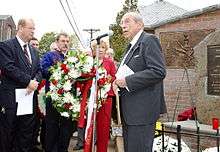
New Brunswick has been described as the nation's "most Hungarian city", with Hungarian immigrants starting to come to the city as early as 1888 and accounting for almost 20% of the city's population in 1915.[53] Hungarians were primarily attracted to the city by employment at Johnson & Johnson factories located in the city.[54] Hungarians settled mainly in what today is the Fifth Ward and businesses were established to serve the needs of the Hungarian community that weren't being met by mainstream businesses.[55] The immigrant population grew until the end of the immigration boom in the early 20th century.
During the Cold War, the community was revitalized by the decision to process the tens of thousands refugees who came to the United States from the failed 1956 Hungarian Revolution at Camp Kilmer, in nearby Edison.[56] Even though the Hungarian population has been largely supplanted by newer immigrants, there continues to be a Hungarian Festival in the city held on Somerset Street on the first Saturday of June each year; the 44th annual event was held in 2019.[57] Many Hungarian institutions set up by the community remain and are active in the neighborhood, including: Magyar Reformed Church, Ascension Lutheran Church, St. Ladislaus Roman Catholic Church, St. Joseph Byzantine Catholic Church, Hungarian American Athletic Club, Aprokfalva Montessori Preschool, Széchenyi Hungarian Community School & Kindergarten, Teleki Pál Scout Home, Hungarian American Foundation, Vers Hangja, Hungarian Poetry Group, Bolyai Lecture Series on Arts and Sciences, Hungarian Alumni Association, Hungarian Radio Program, Hungarian Civic Association, Committee of Hungarian Churches and Organizations of New Brunswick, and Csűrdöngölő Folk Dance Ensemble.
Several landmarks in the city also testify to its Hungarian heritage. There is a street and a park named after Lajos Kossuth, one of the leaders of the Hungarian Revolution of 1848. The corner of Somerset Street and Plum Street is named Mindszenty Square where the first ever statue of Cardinal József Mindszenty was erected.[26] A stone memorial to the victims of the 1956 Hungarian Revolution stands nearby.[58]
Latino community
In the 2010 Census, about 50% of New Brunswick's population is self-identified as Hispanic, the 14th highest percentage among municipalities in New Jersey.[9][59] Since the 1960s, many of the new residents of New Brunswick have come from Latin America. Many citizens moved from Puerto Rico in the 1970s. In the 1980s, many immigrated from the Dominican Republic, and still later from Guatemala, Honduras, Ecuador and Mexico.
Demolition, revitalization and redevelopment
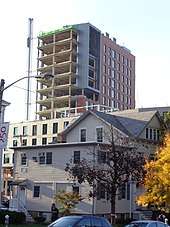
New Brunswick is one of nine cities in New Jersey designated as eligible for Urban Transit Hub Tax Credits by the state's Economic Development Authority. Developers who invest a minimum of $50 million within a half-mile of a train station are eligible for pro-rated tax credit.[60][61]
New Brunswick contains a number of examples of urban renewal in the United States. In the 1960s-1970s, the downtown area became blighted as middle class residents moved to newer suburbs surrounding the city, an example of the phenomenon known as "white flight." Beginning in 1975, Rutgers University, Johnson & Johnson and the city's government collaborated through the New Jersey Economic Development Authority to form the New Brunswick Development Company (DevCo), with the goal of revitalizing the city center and redeveloping neighborhoods considered to be blighted and dangerous (via demolition of existing buildings and construction of new ones).[62][63] Johnson & Johnson announced in 1978 that they would remain in New Brunswick and invest $50 million to build a new world headquarters building in the area between Albany Street, Amtrak's Northeast Corridor, Route 18, and George Street, requiring many old buildings and historic roads to be removed.[64] The Hiram Market area, a historic district that by the 1970s had become a mostly Puerto Rican and Dominican-American neighborhood, was demolished to build a Hyatt hotel and conference center, and upscale housing.[65] Johnson & Johnson guaranteed the investment made by Hyatt Hotels, as they were wary of building an upscale hotel in a run-down area.
Devco, the hospitals, and the city government have drawn ire from both historic preservationists, those opposing gentrification[66] and those concerned with eminent domain abuses and tax abatements for developers.[67]
New Brunswick is home to the main campus of Rutgers University and Johnson and Johnson, which built a new headquarters in 1983.[68][69][70] Both work with Devco in a public–private partnership to redevelop downtown, particularly regarding transit-oriented development.[71][72][73][74][75][76][77] Boraie Development, a real estate development firm based in New Brunswick, has developed projects using the incentives provided by Devco and the state.
Tallest buildings
Christ Church, originally built in 1742, was the tallest building at the time of construction.[78] A steeple was added in 1773 and replaced in 1803.[79]
The six-story First Reformed Church, bullt in 1812 was long the city's tallest structure.[80] One of the earliest tall commercial buildings in the city was the eight-story 34.29 m (112.5 ft) National Bank of New Jersey built in 1908.[81][82] The four nine-story 38 m (125 ft) buildings of the New Brunswick Homes housing project, originally built in 1958, were demolished by implosion in 2000 and largely replaced by low-rise housing.[83][84][85]
While there no buildings over 100 meters (330 feet) in the city, since the millennium a number of high-rise residential buildings[86] clustered around the New Brunswick station have joined those built in the 1960s on the city's skyline.[87][88][89][90][91]
In 2008, there was a proposal to construct a 34-story 142-metre (466 ft) New Brunswick Cultural Center Tower, which would have been the city's tallest building.[92][93] In 2017 it was announced that a new building that would include a performing arts center would be built on the site of the George Street Playhouse and Crossroads Theatre and would include 25 stories of residential and office space.[94][95][96] A new complex, The Hub, will contain the city's tallest buildings upon completion.[75][97]

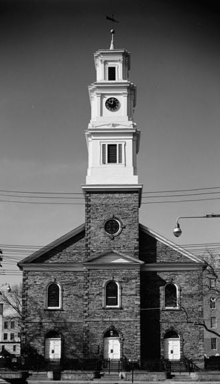
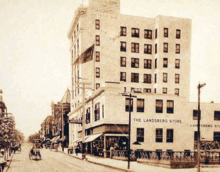
| Rank | Name | image | Height m/ft |
Floors | Year | Notes |
|---|---|---|---|---|---|---|
| 1 | The Vue | 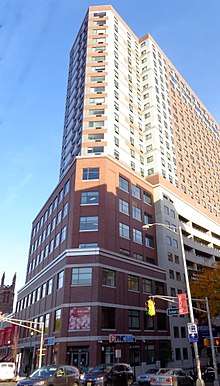 |
91 m (299 ft) | 24 | 2012 | Louis Berger Group[98][88][99][100][101] |
| 2 | One Spring Street | 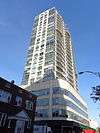 |
78 m (256 ft) | 23 | 2006 | Costas Kondylis[102][88][103][104][105] |
| 3- | New Brunswick Performing Arts Center | 75.62 m (248.1 ft) | 23 | 2019[106] | Elkus Manfredi Architects[107][108][109][110] | |
| 3- | Colony House |  |
75 m (246 ft) | 20 | 1962 | [88][112] |
| 4 | 1 Johnson and Johnson Plaza | 70 m (230 ft) Building of the headquarters of Johnson and Johnson. | 16 | 1983 | I. M. Pei[88][113][114] | |
| 5 | Skyline Tower | 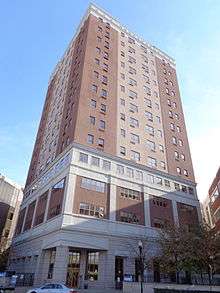 |
59 m (194 ft) | 14 | 1967/2003 | [88][117][118][119] |
| 6 | Schatzman-Fricano Apartments | 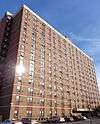 |
59 m (194 ft) | 14 | 1963 | [88][120] |
| 7 | The George | 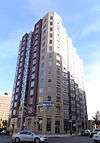 |
14 | 2013 | [121][122][119] | |
| 8 | Riverside Towers | 54 m (177 ft) | 13 | 1964 | [88][123][124] | |
| 9 | The Heldrich | 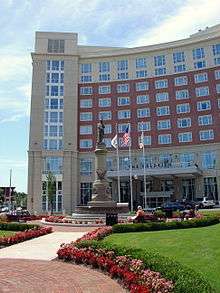 |
50 m (160 ft) | 11 | 2007 | [88][125][126] |
| 10 | Rockhoff Hall/SoCam290 | 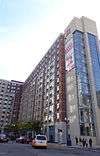 |
50 m (160 ft) | 12 | 2005 | [88][127][128][129][130][131] |
| 11 | Aspire | 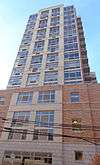 |
49 m (161 ft) | 16/17 | 2015 | Bradford Perkins[132][133][134][135][136][75] |
| 12 | The Yard[137] | .jpg) |
49 m (161 ft) | 14 | 2016[138] | Elkus/Manfredi Architects[139][140][141] |
| 13 | 410 George Street |  |
47 m (154 ft) | 11 | 1989 | Rothe-Johnson Architects[88][142] |
| 14 | University Center | 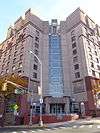 |
45.3 m (149 ft) | 12 | 1994 | [88][143][144] |
Under construction and proposed
| Name | image | Height m/ft |
Floors | Year | Notes |
|---|---|---|---|---|---|
| The Standard | 76 m (249 ft) | 22 | 2014 (approved) | Mark S. Carelli[145][146][147] | |
| The Hub (1) | 91.44 m (300.0 ft) | 25 | (proposed) | Kohn Pedersen Fox[148][149][150][151][152][153] | |
| The Hub (2) | 91.44 m (300.0 ft) | 25 | (proposed) | Kohn Pedersen Fox[148][149][153] | |
| The Hub (3) | 14 | (proposed) | Kohn Pedersen Fox[148] | ||
| Rutgers Cancer Center | 12 | (proposed) | [154] |
Geography
According to the United States Census Bureau, the city had a total area of 5.75 square miles (14.90 km2), including 5.23 square miles (13.55 km2) of land and 0.52 square miles (1.35 km2) of water (9.06%).[1][2] New Brunswick is on the south side of Raritan Valley along with Piscataway, Highland Park, Edison, and Franklin Township. New Brunswick lies southwest of Newark and New York City and northeast of Trenton and Philadelphia.
New Brunswick is bordered by the municipalities of Piscataway, Highland Park and Edison across the Raritan River to the north by way of the Donald and Morris Goodkind Bridges, and also by North Brunswick to the southwest, East Brunswick to the southeast, all in Middlesex County; and by Franklin Township in Somerset County.[155][156][157]
While the city does not hold elections based on a ward system it has been so divided.[158][159][160] There are several neighborhoods in the city, which include the Fifth Ward, Feaster Park,[161] Lincoln Park, Raritan Gardens, and Edgebrook-Westons Mills.[158]
Climate
New Brunswick has a humid subtropical climate (Köppen climate classification Cfa) typical to New Jersey, characterized by humid, hot summers and moderately cold winters with moderate to considerable rainfall throughout the year. There is no marked wet or dry season.
| Climate data for New Brunswick, New Jersey | |||||||||||||
|---|---|---|---|---|---|---|---|---|---|---|---|---|---|
| Month | Jan | Feb | Mar | Apr | May | Jun | Jul | Aug | Sep | Oct | Nov | Dec | Year |
| Average high °F (°C) | 39.2 (4.0) |
42.4 (5.8) |
50.5 (10.3) |
61.7 (16.5) |
71.7 (22.1) |
80.8 (27.1) |
85.6 (29.8) |
83.9 (28.8) |
77.3 (25.2) |
66.0 (18.9) |
55.4 (13.0) |
44.1 (6.7) |
63.3 (17.4) |
| Daily mean °F (°C) | 30.5 (−0.8) |
33 (1) |
40.5 (4.7) |
51 (11) |
60.7 (15.9) |
70.4 (21.3) |
75.3 (24.1) |
73.7 (23.2) |
66.2 (19.0) |
54.5 (12.5) |
45.5 (7.5) |
35.6 (2.0) |
53.1 (11.7) |
| Average low °F (°C) | 21.8 (−5.7) |
23.6 (−4.7) |
30.5 (−0.8) |
40.2 (4.6) |
49.7 (9.8) |
60.0 (15.6) |
64.9 (18.3) |
63.5 (17.5) |
55.1 (12.8) |
42.9 (6.1) |
35.5 (1.9) |
27.1 (−2.7) |
43.0 (6.1) |
| Average precipitation inches (mm) | 3.62 (92) |
2.87 (73) |
4.18 (106) |
4.23 (107) |
4.19 (106) |
4.41 (112) |
5.08 (129) |
4.15 (105) |
4.51 (115) |
3.80 (97) |
3.83 (97) |
4.06 (103) |
48.93 (1,243) |
| Average snowfall inches (cm) | 8.0 (20) |
9.2 (23) |
4.5 (11) |
0.9 (2.3) |
0 (0) |
0 (0) |
0 (0) |
0 (0) |
0 (0) |
0.1 (0.25) |
0.5 (1.3) |
5.2 (13) |
28.4 (70.85) |
| Average precipitation days (≥ 0.01 in) | 10.7 | 9.2 | 10.5 | 11.8 | 12.2 | 11.2 | 10.4 | 9.3 | 8.7 | 8.9 | 9.5 | 9.9 | 122.3 |
| Average snowy days (≥ 0.1 in) | 4.6 | 3.7 | 2.3 | 0.4 | 0 | 0 | 0 | 0 | 0 | 0 | 0.3 | 2.2 | 13.5 |
| Source: NOAA[162][163] | |||||||||||||
Demographics
| Historical population | |||
|---|---|---|---|
| Census | Pop. | %± | |
| 1840 | 5,866 | — | |
| 1850 | 10,019 | 70.8% | |
| 1860 | 11,256 | 12.3% | |
| 1870 | 15,058 | 33.8% | |
| 1880 | 17,166 | 14.0% | |
| 1890 | 18,603 | 8.4% | |
| 1900 | 20,005 | 7.5% | |
| 1910 | 23,388 | 16.9% | |
| 1920 | 32,779 | 40.2% | |
| 1930 | 34,555 | 5.4% | |
| 1940 | 33,180 | −4.0% | |
| 1950 | 38,811 | 17.0% | |
| 1960 | 40,139 | 3.4% | |
| 1970 | 41,885 | 4.3% | |
| 1980 | 41,442 | −1.1% | |
| 1990 | 41,711 | 0.6% | |
| 2000 | 48,573 | 16.5% | |
| 2010 | 55,181 | 13.6% | |
| Est. 2019 | 55,676 | [12][164][165] | 0.9% |
| Population sources: 1860–1920[166] 1840–1890[167] 1850–1870[168] 1850[169] 1870[170] 1880–1890[171] 1890–1910[172] 1860–1930[173] 1930–1990[174] 2000[175][176] 2010[9][10][11] | |||
Census 2010
The 2010 United States Census counted 55,181 people, 14,119 households, and 7,751.331 families in the city. The population density was 10,556.4 per square mile (4,075.8/km2). There were 15,053 housing units at an average density of 2,879.7 per square mile (1,111.9/km2). The racial makeup was 45.43% (25,071) White, 16.04% (8,852) Black or African American, 0.90% (498) Native American, 7.60% (4,195) Asian, 0.03% (19) Pacific Islander, 25.59% (14,122) from other races, and 4.39% (2,424) from two or more races. Hispanic or Latino of any race were 49.93% (27,553) of the population.[9]
Of the 14,119 households, 31.0% had children under the age of 18; 29.2% were married couples living together; 17.5% had a female householder with no husband present and 45.1% were non-families. Of all households, 25.8% were made up of individuals and 7.2% had someone living alone who was 65 years of age or older. The average household size was 3.36 and the average family size was 3.91.[9]
21.1% of the population were under the age of 18, 33.2% from 18 to 24, 28.4% from 25 to 44, 12.2% from 45 to 64, and 5.2% who were 65 years of age or older. The median age was 23.3 years. For every 100 females, the population had 105.0 males. For every 100 females ages 18 and older there were 105.3 males.[9]
The Census Bureau's 2006–2010 American Community Survey showed that (in 2010 inflation-adjusted dollars) median household income was $44,543 (with a margin of error of +/- $2,356) and the median family income was $44,455 (+/- $3,526). Males had a median income of $31,313 (+/- $1,265) versus $28,858 (+/- $1,771) for females. The per capita income for the borough was $16,395 (+/- $979). About 15.5% of families and 25.8% of the population were below the poverty line, including 25.4% of those under age 18 and 16.9% of those age 65 or over.[177]
Census 2000
As of the 2000 United States Census, there were 48,573 people, 13,057 households, and 7,207 families residing in the city. The population density was 9,293.5 per square mile (3,585.9/km2). There were 13,893 housing units at an average density of 2,658.1 per square mile (1,025.6/km2). The racial makeup of the city was 51.7% White, 24.5% African American, 1.2% Native American, 5.9% Asian, 0.2% Pacific Islander, 21.0% from other races, and 4.2% from two or more races. 39.01% of the population were Hispanic or Latino of any race.[175][176]
There were 13,057 households of which 29.1% had children under the age of 18 living with them, 29.6% were married couples living together, 18.0% had a female householder with no husband present, and 44.8% were non-families. 24.3% of all households were made up of individuals and 8.4% had someone living alone who was 65 years of age or older. The average household size was 3.23 and the average family size was 3.69.[175][176]
20.1% of the population were under the age of 18, 34.0% from 18 to 24, 28.1% from 25 to 44, 11.3% from 45 to 64, and 6.5% who were 65 years of age or older. The median age was 24 years. For every 100 females, there were 98.4 males. For every 100 females age 18 and over, there were 96.8 males.[175][176]
The median household income in the city was $36,080, and the median income for a family was $38,222. Males had a median income of $25,657 versus $23,604 for females. The per capita income for the city was $14,308. 27.0% of the population and 16.9% of families were below the poverty line. Out of the total people living in poverty, 25.9% were under the age of 18 and 13.8% were 65 or older.[175][176]
Economy
Health care
City Hall has promoted the nickname "The Health Care City" to reflect the importance of the healthcare industry to its economy.[178] The city is home to the world headquarters of Johnson & Johnson, along with several medical teaching and research institutions including Saint Peter's University Hospital, Robert Wood Johnson University Hospital and the Robert Wood Johnson Medical School, the Cancer Institute of New Jersey, and The Bristol-Myers Squibb Children's Hospital.[179] Described as the first magnet secondary school program teaching directly affiliated with a teaching hospital and a medical school, New Brunswick Health Sciences Technology High School is a public high school, that operates as part of the New Brunswick Public Schools, focused on health sciences.[180]
Urban Enterprise Zone
Portions of the city are part of an Urban Enterprise Zone (UEZ), one of 32 zones covering 37 municipalities statewide. New Brunswick was selected in 2004 as one of two zones added to participate in the program.[181] In addition to other benefits to encourage employment and investment within the Zone, shoppers can take advantage of a reduced 3.3125% sales tax rate (half of the 6 5⁄8% rate charged statewide) at eligible merchants.[182] Established in December 2004, the city's Urban Enterprise Zone status expires in December 2024.[183][184]
Arts and culture
Theatre
Three neighboring professional venues, Crossroads Theatre designed by Parsons+Fernandez-Casteleiro Architects from New York. In 1999, the Crossroads Theatre won the prestigious Tony Award for Outstanding Regional Theatre. Crossroads is the first African American theater to receive this honor in the 33-year history of this special award category.[185] George Street Playhouse (founded in 1974)[186] and the State Theatre (constructed in 1921 for vaudeville and silent films)[187] also form the heart of the local theatre scene. Crossroad Theatre houses American Repertory Ballet and the Princeton Ballet School.[188] Rutgers University has student-run companies such as Cabaret Theatre, The Livingston Theatre Company, and College Avenue Players which perform everything from musicals to dramatic plays to sketch comedy.
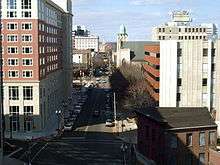
Journalism
Owing in part to its abundance of Rutgers University graduates, New Brunswick has developed a rich history in homegrown journalism over the years. One current news outlet is New Brunswick Today a print and digital publication launched in 2011 by Rutgers journalism alumnus Charlie Kratovil[189] which uses the tagline "Independent news for the greater New Brunswick community". The publication has covered issues with the city's water utility among others and was featured on Full Frontal with Samantha Bee.[190]
Museums
New Brunswick is the site of the Zimmerli Art Museum at Rutgers University (founded in 1966),[191] Albus Cavus, and the Rutgers University Geology Museum (founded in 1872).[192]
Fine arts
New Brunswick was an important center for avant-garde art in the 1950s-70s with several artists such as Allan Kaprow, George Segal, George Brecht, Robert Whitman, Robert Watts, Lucas Samaras, Geoffrey Hendricks, Wolf Vostell and Roy Lichtenstein; some of whom taught at Rutgers University. This group of artists was sometimes referred to as the 'New Jersey School' or the 'New Brunswick School of Painting'. The YAM Festival was venue on May 19, 1963 to actions and Happenings. For more information, see Fluxus at Rutgers University.[193][194]
Grease trucks
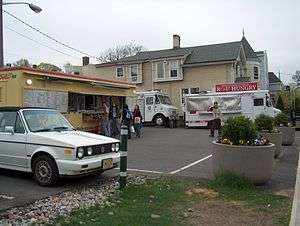
The "Grease trucks" were a group of truck-based food vendors located on the College Avenue campus of Rutgers University. They were known for serving "Fat Sandwiches," sub rolls containing several ingredients such as steak, chicken fingers, French fries, falafel, cheeseburgers, mozzarella sticks, gyro meat, bacon, eggs and marinara sauce. In 2013 the grease trucks were removed for the construction of a new Rutgers building and were forced to move into various other areas of the Rutgers-New Brunswick Campus.[195]
Music
New Brunswick's bar scene has been the home to many original rock bands, including some which went on to national prominence such as The Smithereens and Bon Jovi, as well as a center for local punk rock and underground music. Many alternative rock bands got radio airplay thanks to Matt Pinfield who was part of the New Brunswick music scene for over 20 years at Rutgers University radio station WRSU. Local pubs and clubs hosted many local bands, including the Court Tavern[196] until 2012[197] (since reopened),[198] and the Melody Bar during the 1980s and 1990s. As the New Brunswick basement scene grows in popularity, it was ranked the number 4 spot to see Indie bands in New Jersey.[199] In March 2017, NJ.com wrote that "even if Asbury Park has recently returned as our state's musical nerve center, with the brick-and-mortar venues and infrastructure to prove it, New Brunswick remains as the New Jersey scene's unadulterated, pounding heart."[200]
Government
New Brunswick City Hall, the New Brunswick Free Public Library, and the New Brunswick Main Post Office are located in the city's Civic Square government district, as are numerous other city, county, state, and federal offices.
Local government
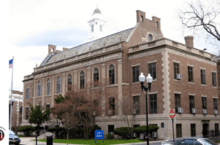
The City of New Brunswick is governed within the Faulkner Act, formally known as the Optional Municipal Charter Law, under the Mayor-Council system of municipal government. The city is one of 71 municipalities (of the 565) statewide governed under this form.[201] The governing body is comprised of a mayor and a five-member City Council, all of whom are elected at-large in partisan elections to four-year terms of office in even-numbered years as part of the November general election. The City Council's five members are elected on a staggered basis, with either two or three seats coming up for election every other year and the mayor up for election at the same time that two council seats are up for vote. As the legislative body of New Brunswick's municipal government, the City Council is responsible for approving the annual budget, ordinances and resolutions, contracts, and appointments to boards and commissions. The Council President, elected to a two-year term by the members of the Council, presides over all meetings.[3][202]
As of 2020, Democrat James Cahill is the 62nd Mayor of New Brunswick; he was sworn in as Mayor on January 1, 1991 and is serving a term that expires on December 31, 2022.[4] Members of the City Council are Council President John A. Andersen (D, 2020), Council Vice President Suzanne M. Sicora Ludwig (D, 2020), Kevin P. Egan (D, 2022), Rebecca H. Escobar (D, 2022) and Glenn J. Fleming Sr. (D, 2020).[203][204][205][206][207]
Police department
The New Brunswick Police Department has received attention for various incidents over the years. In 1991, the fatal shooting of Shaun Potts, an unarmed black resident, by Sergeant Zane Grey led to multiple local protests.[208] In 1996, Officer James Consalvo fatally shot Carolyn "Sissy" Adams, an unarmed prostitute who had bit him.[209] The Adams case sparked calls for reform in the New Brunswick Police Department, and ultimately was settled with the family.[210] Two officers, Sgt. Marco Chinchilla and Det. James Marshall, were convicted of running a bordello in 2001. Chinchilla was sentenced to three years and Marshall was sentenced to four.[211] In 2011, Officer Brad Berdel fatally shot Barry Deloatch, a black man who had run from police (although police claim he struck officers with a stick);[212] this sparked daily protests from residents.[213]
Following the Deloatch shooting, sergeant Richard Rowe was formally charged with mishandling 81 Internal Affairs investigations; Mayor Cahill explained that this would help "rebuild the public's trust and confidence in local law enforcement."[214]
Federal, state and county representation
New Brunswick is located in the 6th Congressional District[215] and is part of New Jersey's 17th state legislative district.[10][216][217]
For the 116th United States Congress, New Jersey's Sixth Congressional District is represented by Frank Pallone (D, Long Branch).[218][219] New Jersey is represented in the United States Senate by Democrats Cory Booker (Newark, term ends 2021)[220] and Bob Menendez (Paramus, term ends 2025).[221][222]
For the 2018–2019 session (Senate, General Assembly), the 17th Legislative District of the New Jersey Legislature is represented in the State Senate by Bob Smith (D, Piscataway) and in the General Assembly by Joseph Danielsen (D, Franklin Township, Somerset County) and Joseph V. Egan (D, New Brunswick).[223][224]
Middlesex County is governed by a Board of Chosen Freeholders, whose seven members are elected at-large on a partisan basis to serve three-year terms of office on a staggered basis, with either two or three seats coming up for election each year as part of the November general election. At an annual reorganization meeting held in January, the board selects from among its members a Freeholder Director and Deputy Director. As of 2015, Middlesex County's Freeholders (with party affiliation, term-end year, residence and committee chairmanship listed in parentheses) are Freeholder Director Ronald G. Rios (D, term ends December 31, 2015, Carteret; Ex-officio on all committees),[225] Freeholder Deputy Director Carol Barrett Bellante (D, 2017; Monmouth Junction, South Brunswick Township; County Administration),[226] Kenneth Armwood (D, 2016, Piscataway; Business Development and Education),[227] Charles Kenny ( D, 2016, Woodbridge Township; Finance),[228] H. James Polos (D, 2015, Highland Park; Public Safety and Health),[229] Charles E. Tomaro (D, 2017, Edison; Infrastructure Management)[230] and Blanquita B. Valenti (D, 2016, New Brunswick; Community Services).[231][232] Constitutional officers are County Clerk Elaine M. Flynn (D, Old Bridge Township),[233] Sheriff Mildred S. Scott (D, 2016, Piscataway)[234] and Surrogate Kevin J. Hoagland (D, 2017; New Brunswick).[232][235]
Politics
As of March 23, 2011, there were a total of 22,742 registered voters in New Brunswick, of which 8,732 (38.4%) were registered as Democrats, 882 (3.9%) were registered as Republicans and 13,103 (57.6%) were registered as Unaffiliated. There were 25 voters registered to other parties.[236]
| Year | Republican | Democratic | Third Parties |
|---|---|---|---|
| 2016[237] | 14.1% 1,516 | 81.9% 8,776 | 4.0% 426 |
| 2012[238] | 14.3% 1,576 | 83.4% 9,176 | 2.2% 247 |
| 2008[239] | 14.8% 1,899 | 83.3% 10,717 | 1.1% 140 |
| 2004[240] | 19.7% 2,018 | 78.2% 8,023 | 1.4% 143 |
In the 2016 presidential election, Democrat Hillary Clinton received 81.9% of the vote (8,779 cast), ahead of Republican Donald Trump with 14.1% (1,516 votes), and other candidates with 4.0% (426 votes), among the 10,721 ballots cast.[241] In the 2012 presidential election, Democrat Barack Obama received 83.4% of the vote (9,176 cast), ahead of Republican Mitt Romney with 14.3% (1,576 votes), and other candidates with 2.2% (247 votes), among the 11,106 ballots cast by the township's 23,536 registered voters (107 ballots were spoiled), for a turnout of 47.2%.[242][243] In the 2008 presidential election, Democrat Barack Obama received 83.3% of the vote (10,717 cast), ahead of Republican John McCain with 14.8% (1,899 votes) and other candidates with 1.1% (140 votes), among the 12,873 ballots cast by the township's 23,533 registered voters, for a turnout of 54.7%.[239] In the 2004 presidential election, Democrat John Kerry received 78.2% of the vote (8,023 ballots cast), outpolling Republican George W. Bush with 19.7% (2,018 votes) and other candidates with 0.7% (143 votes), among the 10,263 ballots cast by the township's 20,734 registered voters, for a turnout percentage of 49.5.[240]
| Year | Republican | Democratic | Third Parties |
|---|---|---|---|
| 2017[244] | 13.6% 590 | 83.1% 3,616 | 3.4% 148 |
| 2013[245] | 31.2% 1,220 | 66.5% 2,604 | 2.3% 92 |
| 2009[246] | 20.9% 1,314 | 68.2% 4,281 | 8.2% 515 |
| 2005[247] | 17.2% 880 | 76.9% 3,943 | 4.2% 214 |
In the 2013 gubernatorial election, Democrat Barbara Buono received 66.5% of the vote (2,604 cast), ahead of Republican Chris Christie with 31.2% (1,220 votes), and other candidates with 2.3% (92 votes), among the 3,991 ballots cast by the township's 23,780 registered voters (75 ballots were spoiled), for a turnout of 16.8%.[248][249] In the 2009 gubernatorial election, Democrat Jon Corzine received 68.2% of the vote (4,281 ballots cast), ahead of Republican Chris Christie with 20.9% (1,314 votes), Independent Chris Daggett with 6.2% (387 votes) and other candidates with 2.0% (128 votes), among the 6,273 ballots cast by the township's 22,534 registered voters, yielding a 27.8% turnout.[246]
Education
Public schools
The New Brunswick Public Schools serve students in pre-kindergarten through twelfth grade. The district is one of 31 former Abbott districts statewide,[250] which are now referred to as "SDA Districts" based on the requirement for the state to cover all costs for school building and renovation projects in these districts under the supervision of the New Jersey Schools Development Authority.[251][252] The district's nine-member Board of Education is elected at large, with three members up for election on a staggered basis each April to serve three-year terms of office; until 2012, the members of the Board of Education were appointed by the city's mayor.[253]
As of the 2018–19 school year, the district, comprised of 11 schools, had an enrollment of 10,422 students and 781.8 classroom teachers (on an FTE basis), for a student–teacher ratio of 13.3:1.[254] Schools in the district (with 2018–19 enrollment data from the National Center for Education Statistics[255]) are Lincoln Annex School[256] (747 students; in grade 4-8), Lincoln Elementary School[257] (544; K-3), Livingston Elementary School[258] (434; K-5), Lord Stirling Elementary School[259] (560; PreK-5), McKinley Community Elementary School[260] (761; PreK-8), A. Chester Redshaw Elementary School[261] (1,012; PreK-5), Paul Robeson Community School For The Arts[262] (665; K-8), Roosevelt Elementary School[263] (733; K-5), Woodrow Wilson Elementary School[264] (416; PreK-8), New Brunswick Middle School[265] (1,167; 6-8), New Brunswick High School[266] (2,206; 9-12), New Brunswick Health Sciences Technology High School[267] (9-12; NA) and New Brunswick P-TECH[268][269][270][271]
The community is also served by the Greater Brunswick Charter School, a K-8 charter school serving students from New Brunswick, Edison, Highland Park and Milltown.[272] As of the 2017–18 school year, the school, had an enrollment of 395 students and 33.0 classroom teachers (on an FTE basis), for a student–teacher ratio of 12.0:1.[273]
Eighth grade students from all of Middlesex County are eligible to apply to attend the high school programs offered by the Middlesex County Vocational and Technical Schools, a county-wide vocational school district that offers full-time career and technical education at Middlesex County Academy in Edison, the Academy for Allied Health and Biomedical Sciences in Woodbridge Township and at its East Brunswick, Perth Amboy and Piscataway technical high schools, with no tuition charged to students for attendance.[274][275]
Higher education
- Rutgers University has three campuses in the city: College Avenue Campus (seat of the University), Douglass Campus, and Cook Campus, which extend into surrounding townships. Rutgers has also added several buildings downtown in the last two decades, both academic and residential.[276]
- New Brunswick is the site to the New Brunswick Theological Seminary, a seminary of the Reformed Church in America, that was founded in New York in 1784, then moved to New Brunswick in 1810.[46]
- Robert Wood Johnson Medical School, part of Rutgers University, is located in New Brunswick and Piscataway.[277]
- Middlesex County College has some facilities downtown, though its main campus is in Edison.[278]
Transportation
Roads and highways
_just_north_of_Exit_9_(New_Jersey_State_Route_18%2C_U.S._Route_1%2C_New_Brunswick)_in_New_Brunswick%2C_Middlesex_County%2C_New_Jersey.jpg)
As of May 2010, the city had 73.24 miles (117.87 km) of roadways, of which 56.13 miles (90.33 km) were maintained by the municipality, 8.57 miles (13.79 km) by Middlesex County, 7.85 miles (12.63 km) by the New Jersey Department of Transportation and 0.69 miles (1.11 km) by the New Jersey Turnpike Authority.[279]
The city is crisscrossed a wide range of roads and highways.[280] In the city is the intersection of U.S. Route 1[281] and Route 18,[282] and is bisected by Route 27.[283] New Brunswick hosts less than a mile of the New Jersey Turnpike (Interstate 95).[284] A few turnpike ramps are in the city that lead to Exit 9 which is just outside the city limits in East Brunswick.[285]
Other major roads that are nearby include the Garden State Parkway in Woodbridge Township and Interstate 287 in neighboring Edison, Piscataway and Franklin townships.
The New Brunswick Parking Authority manages 14 ground-level and multi-story parking facilities across the city.[286][287] CitiPark manages a downtown parking facility at 2 Albany Street.[288][289]
Public transportation

New Brunswick is served by NJ Transit and Amtrak trains on the Northeast Corridor Line.[290] NJ Transit provides frequent service north to Pennsylvania Station, in Midtown Manhattan, and south to Trenton, while Amtrak's Keystone Service and Northeast Regional trains service the New Brunswick station.[291] The Jersey Avenue station is also served by Northeast Corridor trains.[292] For other Amtrak connections, riders can take NJ Transit to Penn Station (New York or Newark), Trenton, or Metropark.
Local bus service is provided by NJ Transit's 810, 811, 814, 815, 818 routes and 980 route.[293][294]
Also available is the extensive Rutgers Campus bus network.[295] Middlesex County Area Transit (MCAT) shuttles provide service on routes operating across the county,[296] including the M1 route, which operates between Jamesburg and the New Brunswick train station.[297] DASH/CAT buses, operated by Somerset County on the 851 and 852 routes connect New Brunswick and Bound Brook.[298][299]
Suburban Trails offers service to and from New York City on Route 100 between Princeton and the Port Authority Bus Terminal; on Route 500 between New Brunswick and along 42nd Street to the United Nations; and Route 600 between East Windsor and Wall Street in Downtown Manhattan.[300] Studies are being conducted to create the New Brunswick Bus Rapid Transit system.
Intercity bus service from New Brunswick to Columbia, Maryland and Washington, DC is offered by OurBus Prime.[301]
New Brunswick was at the eastern terminus of the Delaware and Raritan Canal, of which there are remnants surviving or rebuilt along the river.[302] Until 1936, the city was served by the interurban Newark–Trenton Fast Line, which covered a 72-mile (116 km) route that stopped in New Brunswick as it ran between Jersey City and Trenton.[303]
The Raritan River Railroad ran to New brunswick, but is now defunct along this part of the line. The track and freight station still remain. Proposals have been made to use the line as a light rail route that would provide an option for commuters now driving in cars on Route 18.[304]
Popular culture
- On April 18, 1872, at New Brunswick, William Cameron Coup developed the system of transporting circus equipment, staff and animals from city to city using railroad cars. This system would be adopted by other railroad circuses and used through the golden age of railroad circuses until the 2017 closure of the Ringling Bros. and Barnum & Bailey Circus.[305]
- The play and movie 1776 (film) discusses the Continental Army under General George Washington being stationed at New Brunswick in June 1776 and being inspected by John Adams, Benjamin Franklin and Samuel Chase of Maryland as members of the War Committee.
- The 1980s sitcom, Charles in Charge, was set in New Brunswick.[306]
- The 2004 movie Harold and Kumar Go To White Castle revolves around Harold and Kumar's attempt to get to a White Castle restaurant and includes a stop in a fictionalized New Brunswick.[307]
Points of interest

- Albany Street Bridge, a seven-span stone arch bridge dating to 1892 that was used as part of the transcontinental Lincoln Highway. It stretches 595 feet (181 m) across the Raritan River to Highland Park.[308][309]
- Bishop House, located at 115 College Avenue, is an Italianate architecture mansion built for James Bishop and placed on the National Register of Historic Places in 1976.[310]
- The historic Old Queens Campus and Voorhees Mall at Rutgers University - Old Queens, built in 1809, is the oldest building at Rutgers University. The building's cornerstone was laid in 1809.[42]
- Buccleuch Mansion in Buccleuch Park. Built in 1739 by Anthony White as part of a working farm and home overlooking Raritan Landing, the house and its adjoining 79 acres (32 ha) of land were deeded to the City of New Brunswick to be used as a park in 1911.[311][312]
- Christ Church Episcopal Churchyard had its earliest burial in 1754 and includes the grave sites of slaves.[313]
- The Henry Guest House, added to the National Register of Historic Places in 1976, is a Georgian stone farmhouse built in 1760 by Henry Guest at Livingston Avenue and Morris Street that was moved in 1924 next to the New Brunswick Free Public Library after plans were made to demolish the building at its original site.[314]
- William H. Johnson House is an example of Italianate architecture built c. 1870, when New Brunswick experienced a post-Civil War economic boom. Architectural components including the tall narrow windows with arched tops, double bays, cornice brackets and low pitched roofs exemplify the Italianate style.The house was added to the National Register of Historic Places in July 2006.[315][316]
- St. Peter the Apostle Church, built in 1856 based on a designed by Patrick Keeley, is located at 94 Somerset Street.[317]
- Delaware and Raritan Canal - Completed in 1834, the canal reached its peak in the 1860s and 1870s, when its primary use was to transport coal from Pennsylvania to New York City. Accessing the canal at Bordentown on the Delaware River, the main route covered 44 miles (71 km) to New Brunswick on the Raritan River.[318]
- Birthplace of poet Joyce Kilmer - Located on Joyce Kilmer Avenue, the building is where the poet and essayist was born on December 6, 1886. Acquired by a local American Legion post, the building and its second-floor memorial to Kilmer was soled to the state in the 1960s, which then transferred it to the owenership of the City of New Brunswick.[319]
- Site of Johnson & Johnson world headquarters
- The Willow Grove Cemetery - located behind the Henry Guest House and the New Brunswick Free Public Library, the site of the cemetery was acquired in the late 1840s, the cemetery association was incorporated in 1850 and a state charter was granted the following year.[320]
- Mary Ellis grave (1750–1828) stands out due to its location in the AMC Theatres parking lot on U.S. Route 1 downriver from downtown New Brunswick.[321]
- Lawrence Brook, a tributary of the Raritan River has a watershed covering 48 square miles (120 km2) that includes New Brunswick, as well as East Brunswick, Milltown, North Brunswick and South Brunswick.[322]
- Elmer B. Boyd Park, a park running along the Raritan River, covering 20 acres (8.1 ha) adjacent to Route 18, the park went through an $11-million renovation project and reopened to the public in 1999.[323]
Places of worship
- Abundant Life Family Worship Church - founded in 1991.[324]
- Anshe Emeth Memorial Temple (Reform Judaism) - established in 1859.[325]
- Ascension Lutheran Church - founded in 1908 as The New Brunswick First Magyar Augsburg Evangelical Church.[326]
- Christ Church, Episcopal - granted a royal charter in 1761.[327]
- Ebenezer Baptist Church
- First Baptist Church of New Brunswick, American Baptist
- First Presbyterian, Presbyterian (PCUSA)
- First Reformed Reformed (RCA)
- Kirkpatrick Chapel at Rutgers University (nondenominational)
- Magyar Reformed, Calvinist
- Mount Zion AME (African Methodist Episcopal)
- Mt. Zion Ministries Family Worship Church
- Nativity of the Blessed Virgin Mary Ukrainian Catholic Church
- Point Community Church
- Saint Joseph, Byzantine Catholic
- Saint Ladislaus, Roman Catholic
- Saint Mary of Mount Virgin Church, Remsen Avenue and Sandford Street, Roman Catholic
- Sacred Heart Church, Throop Avenue, Roman Catholic
- Saint Peter the Apostle Church, Somerset Street, Roman Catholic
- Second Reformed Church, Reformed (RCA)
- Sharon Baptist Church
- United Methodist Church at New Brunswick
- Voorhees Chapel at Rutgers University (nondenominational)
Notable people
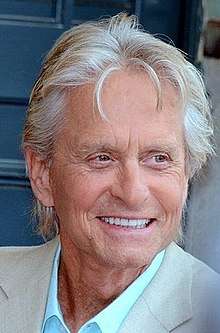

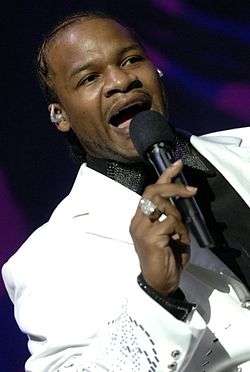
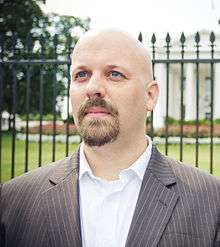

People who were born in, residents of, or otherwise closely associated with the City of New Brunswick include:
- David Abeel (1804–1846), Dutch Reformed Church missionary.[328]
- Garnett Adrain (1815–1878), member of the United States House of Representatives.[329]
- Charlie Atherton (1874–1934), major league baseball player.[330]
- Jim Axelrod, national correspondent for CBS News, and reports for the CBS Evening News.[331]
- Catherine Hayes Bailey (1921–2014), plant geneticist who specialized in fruit breeding.[332]
- Joe Barzda (1915–1993), race car driver.[333][334]
- John Bayard (1738–1807), merchant, soldier and statesman who was a delegate for Pennsylvania to the Continental Congress in 1785 and 1786, and later mayor of New Brunswick.[335]
- John Bradbury Bennet (1865–1940), United States Army officer and brigadier general active during World War I.[336]
- James Berardinelli (born 1967), film critic.[337][338]
- James Bishop (1816–1895), represented New Jersey's 3rd congressional district in the United States House of Representatives from 1855 to 1857.[339]
- Charles S. Boggs (1811–1877), Rear Admiral who served in the United States Navy during the Mexican–American War and the American Civil War.[340]
- PJ Bond, singer-songwriter.[341]
- Jake Bornheimer (1927–1986), professional basketball player for the Philadelphia Warriors.[342]
- James Bornheimer (1933–1993), politician who served in the New Jersey General Assembly from 1972 to 1982 and in the New Jersey Senate from 1982 to 1984.[343]
- Brett Brackett (born 1987), football tight end.[344]
- Derrick Drop Braxton (born 1981), record producer and composer.[345]
- Sherry Britton (1918–2008), burlesque performer and actress.[346]
- Gary Brokaw (born 1954), former professional basketball player who played most of his NBA career for the Milwaukee Bucks.[347]
- Jalen Brunson (born 1996), basketball player.[348]
- William Burdett-Coutts (1851–1921), British Conservative politician who sat in the House of Commons from 1885 to 1921.[349]
- Darhyl Camper (born 1990), singer-songwriter and record producer.[350]
- Arthur S. Carpender (1884–1960), United States Navy admiral who commanded the Allied Naval Forces in the Southwest Pacific Area during World War II.[351]
- Jonathan Casillas (born 1987), linebacker for the NFL's New Orleans Saints and University of Wisconsin.[352]
- Joseph Compton Castner (1869–1946), Army general[353]
- Andre Dixon (born 1986), former professional football running back.[354]
- Wheeler Winston Dixon (born 1950), filmmaker, critic, and author.[355][356]
- Michael Douglas (born 1944), actor.[357]
- Linda Emond (born 1959), actress.[358]
- Jerome Epstein (born 1937), politician who served in the New Jersey Senate from 1972 to 1974 and later went to federal prison for pirating millions of dollars worth of fuel oil.[359]
- Anthony Walton White Evans (1817–1886), engineer.[360]
- Robert Farmar (1717–1778), British Army officer who fought in the Seven Years' War and served as interim governor of British West Florida.[361]
- Mervin Field (1921–2015), pollster of public opinion.[362]
- Louis Michael Figueroa (born 1966), arguably the most prolific transcontinental journeyman.[363]
- Margaret Kemble Gage (1734–1824). wife of General Thomas Gage, who led the British Army in Massachusetts early in the American Revolutionary War and who may have informed the revolutionaries of her husband's strategy.[364]
- Morris Goodkind (c. 1888–1968), chief bridge engineer for the New Jersey State Highway Department from 1925 to 1955 (now the New Jersey Department of Transportation), responsible for the design of the Pulaski Skyway and 4,000 other bridges.[365]
- Vera Mae Green (1928–1982), anthropologist, educator and scholar, who made major contributions in the fields of Caribbean studies, interethnic studies, black family studies and the study of poverty and the poor.[366]
- Alan Guth (born 1947), theoretical physicist and cosmologist best known for his theory of cosmological inflation.[367]
- All involved in the Hall-Mills Murder case of the 1920s.[368]
- Augustus A. Hardenbergh (1830–1889), represented New Jersey's 7th congressional district from 1875 to 1879, and again from 1881 to 1883.[369]
- Mel Harris (born 1956), actress.[370]
- Mark Helias (born 1950), jazz bassist / composer.[371]
- Susan Hendricks (born 1973), anchor for HLN and substitute anchor for CNN.[372]
- Laurie Hernandez (born 2000), artistic gymnast representing Team USA at the 2016 Summer Olympics.[373]
- Sabah Homasi (born 1988), mixed martial artist who competes in the welterweight division.[374]
- Christine Moore Howell (1899–1972), hair care product businesswoman who founded Christine Cosmetics.[375]
- Adam Hyler (1735–1782), privateer during the American Revolutionary War.[376]
- Jaheim (born 1978, full name Jaheim Hoagland), R&B singer.[377]
- Dwayne Jarrett (born 1986), wide receiver for the University of Southern California football team 2004 to 2006, current WR drafted by the Carolina Panthers.[378]
- James P. Johnson (1891–1955), pianist and composer who was one of the original stride piano masters.[379]
- William H. Johnson (1829–1904), painter and wallpaper hanger, businessman and local crafts person, whose home (c. 1870) was placed on the State of New Jersey and National Registers of Historic Places in 2006.[380]
- Robert Wood Johnson I (1845–1910), businessman who was one of the founders of Johnson & Johnson.[381]
- Robert Wood Johnson II (1893–1968), businessman who led Johnson & Johnson and served as mayor of Highland Park, New Jersey.[382]
- Woody Johnson (born 1947), businessman, philanthropist, and diplomat who is currently serving as United States Ambassador to the United Kingdom.[383]
- Mary Lea Johnson Richards (1926–1990), heiress, entrepreneur and Broadway producer, who was the first baby to appear on a Johnson's baby powder label.[384]
- Frederick Barnett Kilmer (1851–1934), pharmacist, author, public health activist and the director of Scientific Laboratories for Johnson & Johnson from 1889 to 1934.[385]
- Joyce Kilmer (1886–1918), poet.[386]
- Littleton Kirkpatrick (1797–1859), represented New Jersey's 4th congressional district in the United States House of Representatives from 1853 to 1855, and was mayor of New Brunswick in 1841 and 1842.[387]
- Ted Kubiak (born 1942), MLB player for the Kansas City/Oakland Athletics, Milwaukee Brewers, St. Louis Cardinals, Texas Rangers, and the San Diego Padres.[388]
- Roy Mack (1889-1962), director of film shorts, mostly comedies, with 205 titles to his credit.[389]
- Floyd Mayweather Jr. (born 1977), multi-division winning boxer, currently with an undefeated record of 50–0; he grew up in the 1980s in the Hiram Square neighborhood.[390]
- Jim Norton (born 1968), comedian.[391]
- Robert Pastorelli (1954–2004), actor known primarily for playing the role of the house painter on Murphy Brown.[392]
- Judith Persichilli (born 1949), nurse and health care executive who has served as the Commissioner of the New Jersey Department of Health.[393]
- Stephen Porges (born 1945), Professor in the Department of Psychiatry at the University of North Carolina at Chapel Hill.[394]
- Franke Previte, composer.[395]
- Phil Radford (born 1976), Greenpeace Executive Director.
- Miles Ross (1827–1903), Mayor of New Brunswick, U.S. Representative and businessman.[396]
- Mohamed Sanu (born 1989), American football wide receiver for the New England Patriots.[397]
- Gabe Saporta (born 1979), musician and frontman of bands Midtown and Cobra Starship.[398]
- Robert J. Sexton, writer and director
- Jeff Shaara (born 1952), historical novelist.[399]
- Dustin Sheppard (born 1980), retired professional soccer player who played in MLS for the MetroStars.[400]
- George Sebastian Silzer (1870–1940), served as the 38th Governor of New Jersey. Served on the New Brunswick board of aldermen from 1892 to 1896.[401]
- James H. Simpson (1813–1883), U.S. Army surveyor of western frontier areas.[402]
- Arthur Space (1908–1983), actor of theatre, film, and television.[403]
- Larry Stark (born 1932), theater reviewer and creator of Theater Mirror.[404]
- Matt Taibbi (born 1970), author and journalist.[405]
- Ron "Bumblefoot" Thal (born 1969), guitarist, musician, composer.[406]
- Joe Theismann (born 1949), former professional quarterback who played in the NFL for the Washington Redskins and former commentator on ESPN's Monday Night Football.[407]
- William Henry Vanderbilt (1821–1885), businessman.[408]
- John Van Dyke (1807–1878), represented New Jersey's 4th congressional district in the United States House of Representatives from 1847 to 1851, and served as Mayor of New Brunswick from 1846 to 1847.[409]
- Paul Wesley (born 1982), actor, known for his role as "Stefan Salvatore" on The CW show The Vampire Diaries.[410]
- Rev. Samuel Merrill Woodbridge (1819–1905), minister, author, professor at Rutgers College and New Brunswick Theological Seminary.[411]
- Eric Young (born 1967), former Major League Baseball player.[412]
- Eric Young Jr. (born 1985), Major League Baseball player.[413]
- All members of The Gaslight Anthem[414]
- All members of Streetlight Manifesto[415]
- All members of the Bouncing Souls[416]
- All members of Thursday (band)
Sister cities
New Brunswick has four sister cities, as listed by Sister Cities International:[417][418]




References
- 2019 Census Gazetteer Files: New Jersey Places, United States Census Bureau. Accessed July 1, 2020.
- US Gazetteer files: 2010, 2000, and 1990 , United States Census Bureau. Accessed September 4, 2014.
- 2012 New Jersey Legislative District Data Book, Rutgers University Edward J. Bloustein School of Planning and Public Policy, March 2013, p. 81.
- , City of New Brunswick. Accessed December 1, 2019.
- 2020 New Jersey Mayors Directory, New Jersey Department of Community Affairs. Accessed February 1, 2020.
- Administration Staff, City of New Brunswick. Accessed December 11, 2019.
- Leslie Zeledón Appointed as New City Clerk City of New Brunswick. Accessed December 11, 2019. "New Brunswick City Council appointed Leslie R. Zeledón as the new City Clerk at its 2019 Reorganization Meeting at City Hall. Zeledón has served as Deputy Clerk for the City of New Brunswick since September 2011. She replaces longtime City Clerk Daniel A. Torrisi, who was appointed by Mayor Cahill to serve as City Administrator."
- "City of New Brunswick". Geographic Names Information System. United States Geological Survey. Retrieved March 8, 2013.
- DP-1 - Profile of General Population and Housing Characteristics: 2010 for New Brunswick city, Middlesex County, New Jersey , United States Census Bureau. Accessed April 18, 2012.
- Municipalities Sorted by 2011-2020 Legislative District, New Jersey Department of State. Accessed February 1, 2020.
- Table DP-1. Profile of General Demographic Characteristics: 2010 for New Brunswick city Archived 2014-01-17 at the Wayback Machine, New Jersey Department of Labor and Workforce Development. Accessed April 18, 2012.
- QuickFacts for New Brunswick city, New Jersey; Middlesex County, New Jersey; New Jersey from Population estimates, July 1, 2019, (V2019), United States Census Bureau. Accessed May 21, 2020.
- GCT-PH1 Population, Housing Units, Area, and Density: 2010 - State -- County Subdivision from the 2010 Census Summary File 1 for New Jersey , United States Census Bureau. Accessed November 23, 2012.
- Look Up a ZIP Code for New Brunswick, NJ, United States Postal Service. Accessed April 18, 2012.
- Zip Codes, State of New Jersey. Accessed August 18, 2013.
- Area Code Lookup - NPA NXX for New Brunswick, NJ, Area-Codes.com. Accessed October 6, 2014.
- U.S. Census website , United States Census Bureau. Accessed September 4, 2014.
- Geographic codes for New Jersey, Missouri Census Data Center. Accessed September 1, 2019.
- US Board on Geographic Names, United States Geological Survey. Accessed September 4, 2014.
- Staff. "Lew Dockstader, Minstrel, Is Dead. Famous Comedian Succumbs to a Bone Tumor at His Daughter's Home at 68", The New York Times, October 27, 1924. Accessed May 18, 2015.
- New Jersey County Map, New Jersey Department of State. Accessed July 10, 2017.
- Table 7. Population for the Counties and Municipalities in New Jersey: 1990, 2000 and 2010, New Jersey Department of Labor and Workforce Development, February 2011. Accessed November 23, 2012.
- "7:30 a.m.—Filling cracks in the health care city", Home News Tribune, September 23, 1999. "With two major hospitals and a medical school, New Brunswick proclaims itself The Healthcare City."
- "A wet day in the Hub City", Home News Tribune, September 23, 1999. "A few days short of 60 years, on Wednesday, Sept. 16, a dreary, drizzly day just ahead of the deluge of Hurricane Floyd, the Home News Tribune sent 24 reporters, 9 photographers and one artist into the Hub City, as it is known, to take a peek into life in New Brunswick as it is in 1999."
- Weiss, Jennifer. "Redevelopment; As New Brunswick Grows, City's Hungarians Adapt", The New York Times, July 16, 2006. Accessed December 11, 2019. "While the Hungarian community has diminished over the years—in the 1930s it made up a third of New Brunswick's population—much of what it built remains."
- Zinsmeister, James A. "New Brunswick Journal; Where Hungarian Pride Lives On", The New York Times, June 28, 1992. Accessed December 12, 2019. "On one corner, a statue of Josef Cardinal Mindszenty, the late, beloved primate of Hungary, rises amid flowers before a large blue spruce. Across the way, a small granite monument bears a newly burnished bronze plaque that commemorates the Hungarian revolution.... While it is difficult to determine precisely how many Hungarian-Americans live in New Brunswick, Dr. August Molnar, director of the Hungarian Heritage Center, estimates that 3,200 do. That represents about 8 percent of the city's population, down from nearly 10 percent in 1980."
- Brennan, Ray. "Rutgers Historical Background", Rutgers Rarities. Accessed December 12, 2019. "According to Virtual Field Trip, New Brunswick was '...the place where the very important Native American Minisink Trail crossed the Raritan River. This later, as was the case with many other Native American routeways, became one of the most important colonial roads - the main overland route between New York and Philadelphia'"
- Staff. "New-Jersey.; Miscellaneous Notes about New-Brunswick.", The New York Times, July 27, 1854. Accessed December 11, 2019. "If the 'desperately hot' weather permit, I purpose to give you a few items of general interest respecting this ancient Dutch settlement. However, with the mercury ranging from 78° to 98° in the shade, during the sixteen hours of sunshine, you will not expect much exertion on my part. Daniel Cooper (says Gordon,) was the first recorded inhabitant of 'Prigmore's Swamp.'"
- Hutchinson, Viola L. The Origin of New Jersey Place Names, New Jersey Public Library Commission, May 1945. Accessed September 9, 2015.
- Gannett, Henry. The Origin of Certain Place Names in the United States, p. 223. United States Government Printing Office, 1905. Accessed September 9, 2015.
- Snyder, John P. The Story of New Jersey's Civil Boundaries: 1606–1968, Bureau of Geology and Topography; Trenton, New Jersey; 1969. p. 171. Accessed March 26, 2012.
- Revolutionary War Sites in New Brunswick, Revolutionary War New Jersey. Accessed August 18, 2013.
- Heintze, James R. Declaration of Independence: First Public Readings, American University, backed up by the Internet Archive as of June 15, 2004. Accessed December 11, 2019. "July 9 or 10 - New Brunswick, N.J. Col. John Neilson; Harper's New Monthly Magazine, July 1892, 251."
- Lee, Eunice. "Statue of New Brunswick Revolutionary War figure planned", The Star-Ledger, July 31, 2011. Accessed August 18, 2013. "New Brunswick Public Sculpture, a nonprofit, is commissioning a life-size bronze statue of Col. John Neilson, a New Jersey native who gave one of the earliest readings of the Declaration of Independence on July 9, 1776, while standing before a crowd in New Brunswick."
- Did You Know Answer 2, City of New Brunswick. Accessed December 11, 2019. "The 3rd public reading of the Declaration of Independence took place outside a tavern on Albany Street on July 9, 1776. The document was en route from Philadelphia to New York when Col. John A. Neilson stood outside a tavern, atop a table, and read it to the townspeople!"
- Makin, Cheryl. "Revolutionary moment comes to life, 241 years later", Courier News, July 10, 2017. Accessed December 11, 2019. "Neilson was born March 11, 1745 in the city that now bears a street with his name, in addition to Neilson Hall on the Rutgers University campus and, as of Sunday, a sculpture depicting a defining moment in his life and the country's history. It also is the only statue depicting a reading of the Declaration of Independence in the U.S., Ritter said."
- "A Historical Sketch of Rutgers University: Section 1", Rutgers University Libraries. Accessed December 11, 2019. "With an adequate charter obtained and the governing board assembled, the trustees turned to selecting a site for Queen's College. The members were split on whether to locate the college in Hackensack or New Brunswick.... The Reverend John H. Goetschius, an early advocate for the college, claimed that the academy he began in Hackensack served as an advantage for establishing the college in Bergen County. But the supporters of New Brunswick reminded their colleagues that the Reverend John Leydt of New Brunswick had joined with Hardenbergh and other members of that community to establish a Grammar school in 1768. Four years passed before the trustees met in May 1771 to present their subscriptions and choose the location for the college. A vote of ten to seven placed the college in New Brunswick."
- Our History, Rutgers University. Accessed December 11, 2019. "1771 - The first class is held A handful of students attend class at a converted tavern, the Sign of the Red Lion, at the corner of Albany and Neilson streets in New Brunswick. Today, original stones from the building are incorporated into a bench near the center of Voorhees Mall on the College Avenue Campus, a 40th reunion gift from the Class of 1939. 1774 - The first commencement Matthew Leydt is the only graduate in the first commencement class."
- Benedict, William H. "Early Taverns in New Brunswick", in Proceedings of the New Jersey Historical Society, p. 136. New Jersey Historical Society, 1918, Volume 3, Issue 3. Accessed December 11, 2019.
- Paths to Historic Rutgers: A Self-Guided Tour, Rutgers University Libraries. Accessed December 11, 2019. "Old Queen's, the home of the administrative officers of Rutgers University, was originally known as the Queens College building. Designed in 1808-09 by the noted architect, John McComb, who also designed City Hall in New York, the building is one of the finest examples of Federal architecture in the United States. When first occupied in 1811, Old Queens housed the academic work of the College, the New Brunswick Theological Seminary, and the Rutgers Preparatory School, then known as the Grammar School."
- Fuentes, Marisa; and White, Deborah.Scarlet and Black: Slavery and Dispossession in Rutgers History, Rutgers University Press, 2016, New Brunswick, New Jersey. Accessed December 11, 2019.
- "Old Queens Reigns at Rutgers for 200 Years The university celebrates the state’s oldest, intact higher education building", Rutgers Today, April 27, 2009. Accessed December 12, 2019. "The cornerstone of Old Queens was laid April 27, 1809. The building originally housed the university’s preparatory school, college and theological seminary as well as residential units for faculty. Old Queens is now occupied by Rutgers’ central administrative offices."
- Paths to Historic Rutgers: A Self-Guided Tour - Alexander Johnston Hall, Rutgers University. Accessed August 29, 2017. "Alexander Johnston Hall was built by Nicholas Wyckoff in 1830 to provide a home for the Rutgers Preparatory School, which had shared space in Old Queens with the College and New Brunswick Theological Seminary since 1811."
- History, Rutgers University. Accessed July 13, 2016. "In 1945 and 1956, state legislative acts designated Rutgers as The State University of New Jersey, a public institution."
- Rutgers College Grammar School, Rutgers University Common Repository. Accessed August 18, 2013. "The Rutgers Preparatory School remained in New Brunswick until 1957, when it moved to its current location in Somerset, N.J."
- 2016-17 Academic Catalog, New Brunswick Theological Seminary. Accessed August 29, 2017. "In 1796, the school moved to Brooklyn and in 1810 to New Brunswick, to serve better the church and its candidates for ministry. Since 1856, New Brunswick Seminary has carried on its life and work on its present New Brunswick campus."
- Heyboer, Kelly. "New Brunswick Theological Seminary sells part of historic campus to Rutgers for a fresh start", NJ Advance Media for NJ.com, September 8, 2013, updated March 30, 2019. Accessed December 12, 2019. "In a complex deal that will transform part of downtown New Brunswick, the nation’s oldest Protestant seminary is selling most of its hilltop campus to neighboring Rutgers University. The seminary is using the cash to build a new state-of-the-art building at the base of the hill on the corner of College Avenue. New Brunswick Theological Seminary officials say the radical decision to sell and demolish 10 buildings on one of New Jersey’s most historic campuses is an answer to their prayers."
- Armstead, Shaun; Sutter, Brenann; Walker, Pamela; Wiesner, Caitlin (2016). ""And I Poor Slave Yet": The Precarity of Black Life in New Brunswick, 1766–1835". In Fuentes, Marisa; White, Deborah Gray (eds.). Scarlet and Black: Slavery and Dispossession in Rutgers History. New Brunswick, NJ: Rutgers University Press. JSTOR j.ctt1k3s9r0.9.
- An act for the Gradual Abolition of Slavery, Rutgers University Libraries. Accessed December 12, 2019.
- New Jersey's African American Tour Guide, New Jersey Commerce and Economic Growth Commission. Accessed December 17, 2014. "At the southern edge of the Gateway Region is New Brunswick, a town with much culture to offer and African American history to explore. African Americans were living here as far back as 1790, and by 1810, the Census listed 53 free Blacks—and 164 slaves—out of the 469 families then living in town. One of the state's oldest Black churches, Mt. Zion A.M.E., at 25 Division Street, was founded in 1825."
- Makin, Cheryl. "AME churches celebrate spirituality, longevity", Courier News, October 27, 2017. Accessed December 12, 2019. "The historic Mount Zion A.M.E. Church-New Brunswick is the oldest African American church in Middlesex County. Now at 39 Hildebrand Way, the church began with a small plot of land on Division Street in 1827. The church was founded by a mix of 'enslaved and free people,' 36 years prior to the Emancipation Proclamation, said Eric Billips, pastor since 2013 at Mount Zion A.M.E. Church-New Brunswick.... In 1827, records show that Joseph and Jane Hoagland, along with other black men and women in the New Brunswick area, were founders of the church."
- Wright, Giles R. "Afro-Americans in New Jersey: a short history - Appendix 3, New Jersey Historical Commission, 1989, Trenton, New Jersey. Accessed December 12, 2019.
- "New Brunswick Walk, 2003", Rutgers University. Accessed December 12, 2019. "New Brunswick has been called 'the most Hungarian city in the US' because proportionately it once had more Hungarians than any other city. In 1915, out of a total population of 30,013, there were 5,572 Hungarians. The first immigrants came in 1888 and there followed, in the early twentieth century, many skilled workers who found employment in the former cigar factory on Somerset Street and at J and J."
- Gurowitz, Margaret. "Hungarian University", Kilmer House, June 19, 2008. Accessed December 12, 2019. "Large numbers of Hungarians settled in New Jersey and especially in New Brunswick, which had lots of industry to provide employment. Besides Johnson & Johnson, there was a cigar box manufacturer (which explains why many of our early medicated plasters were in cigar-box packaging…we bought the boxes from the neighboring factory), a button factory, a wallpaper factory, and more."
- "Magyar Bank – New Brunswick, New Jersey", Hungarian Free Press, November 10, 2018. Accessed December 12, 2019. "Magyar Bank has an interesting history. Originally it was founded in 1922 as the Magyar Building and Loan Association by local Hungarian immigrants. Most of these Hungarian Americans settled in the city’s Fifth Ward and the bank provided loans for their families."
- Coriden, Guy E. "Report on Hungarian Refugees", Central Intelligence Agency. Accessed December 12, 2019. "As of 1 September 1957, approximately 35,000 of these refugees had accepted asylum in the US. In early November 1956, when it became apparent that a massive influx of Hungarians was going to have to be resettled, it was decided that Camp Kilmer, New Jersey, would be the processing center for all of the refugees.... From the arrival of the first refugees on 21 November 1956 until early May 1957, when Camp Kilmer was closed, transportation was provided by 214 MATS flights, 5 military Sea Transport Service (MSTS) ocean voyages, and 133 flights chartered by the Intergovernmental Committee for European Migration (ICEM)."
- "40 of the best things to do this weekend in NJ — May 31 - Jun 2", NJ 101.5, May 30, 2019. Accessed December 12, 2019. "44th Annual Hungarian Festival The Hungarian Festival comes to New Brunswick for the 44th year in a row! Experience all things Hungarian as Somerset Street is transformed - enjoy fine Hungarian foods, great Hungarian dances and music."
- Hungarian Memorials and Markers in the USA, The American Hungarian Federation. Accessed December 12, 2019. "New Brunswick, NJ - Mindszenty statue and square"
- Mascarenhas, Rohan. "Census data shows Hispanics as the largest minority in N.J.", The Star-Ledger, February 3, 2011. Accessed June 24, 2013.
- Urban Transit Hub Tax Credit Program Approved Projects, New Jersey Economic Development Authority. Accessed January 11, 2015.
- Middlesex County: New Brunswick - Urban Transit Hub Tax Credits, New Jersey Economic Development Authority. Accessed January 11, 2015.
- Picard, Joseph. "New Brunswick Plan Debates", The New York Times, June 28, 1987. Accessed December 12, 2019. "Johnson & Johnson, the multinational medical-supplies giant based here since 1886, set the redevelopment in motion in 1973 by calling in consultants to consider its feasibility. One, the American City Corporation of Columbia, Md., has been credited with setting the direction for the revitalization. By 1975, New Brunswick Tomorrow (N.B.T.) and the New Brunswick Development Corporation (Devco) had started up, the former as the revitalization's promotional arm and the latter as its chief developer. They have, from the beginning, shared in and promoted Johnson & Johnson's vision for New Brunswick's future."
- "Devco spends $1.6 billion since 1970s", The Daily Targum, January 25, 2006, backed up by the Internet Archive as of March 11, 2007. Accessed August 29, 2017.
- Waggoner, Walter H. "Johnson & Johnson Expanding in New Jersey; Planning $50 Million Headquarters in Downtown New Brunswick", The New York Times, April 7, 1978. Accessed December 12, 2019. "Johnson & Johnson Inc. announced today that would construct a new $50 million worldwide corporate headquarters in down town New Brunswick. The medical-supplies company, already, the major taxpayer in this Middlesex County urban center, said it had spurned temptations to move its headquarters to suburban sites and that it was committed to the revitalization of this city of 40,000.... The whole complex will be located just south of Johnson & Johnson's red brick Georgian colonial headquarters structure, bounded by George Street on the east, the Amtrak railroad tracks on the north, Albany Street, or Route 27, on the south, and Peace and Water Streets on the west. "
- Rangel, Jesus. "Raids by Housing Inspectors Anger Jersey Neighborhood", The New York Times, March 12, 1988. Accessed December 12, 2019. "When city officials, acting on a tip, found that illegal immigrants were crowding into houses in a poor neighborhood here, they began a campaign to crack down on building-code violations.... But to many residents of Ward 2, particularly its Mexicans, Dominicans, Central Americans and Puerto Ricans, the inspections have been raids aimed at the neighborhood because it lies in the path of New Brunswick's urban-renewal plans.... The site of the hotel and conference center used to be the Hiram Street market area, a predominantly Puerto Rican and Dominican neighborhood."
- "Students protest DevCo redevelopment", The Daily Targum, September 15, 1999.
- Tenants' place is uncertain, The Daily Targum, November 9, 1999.
- Courtney, Marian. "Corporate Offices: New State Image", The New York Times October 23, 1983. Accessed December 12, 2019. "When Johnson & Johnson decided to build its new world headquarters in the city where it had been lodged for almost 100 years, it assumed a leadership role in New Brunswick Tomorrow, the government-industry alliance that is rebuilding a deteriorating central business district."
- Attrino, Anthony G. "John J. Heldrich, former top executive at Johnson & Johnson and civic leader, dies at 88", NJ Advance Media for NJ.com, October 28, 2014, updated March 29, 2019. Accessed December 12, 2019.
- Lane, Alexander. "Time to turn another corner; Next generation of builders has designs on New Brunswick", The Star-Ledger, June 30, 2002, backed up by the Internet Archive as of November 9, 2014. Accessed December 12, 2019.
- Peet, Judy. "Private company's redevelopment of New Brunswick could be model for Atlantic City revamp", The Star-Ledger, August 29, 2010, updated April 1, 2019. Accessed December 12, 2019. "Currently in the works are a 632,000-square-foot 'transit village' adjacent to the train station and $165 million research tower. Devco now owns 2 million square feet of space in the city, including the Middlesex County courthouse, according to Devco records. Unlike redevelopment in Newark and Camden, the Devco model didn’t try to revitalize multiple neighborhoods with individual projects, but instead concentrated on a small, extremely dense corridor within approximately 10 blocks of the New Brunswick train station."
- Narvaez, Alfonso. "Building's Sale Backs New Brunswick Revival", The New York Times, June 17, 1984. Accessed December 12, 2019.
- Martin, Antoinette. "At Two Extremes of a Housing Market", The New York Times, March 6, 2005. Accessed December 12, 2019.
- Miller, Paige. "In New Brunswick, one development tackles multiple community needs", Smart Growth America, May 7, 2012. Accessed December 13, 2019. "When Smart Growth America’s coalition partner New Jersey Future announced its 2012 Smart Growth Award winners in April, it was no surprise that New Brunswick’s Gateway Transit Village received the award for Transit-Oriented Development Partnership. The Gateway Transit Village is a new development in downtown New Brunswick that includes parking, retail, office and residential space. Gateway is known as a transit-oriented development because it is located across from a train station, easily connecting the building’s tenants and patrons to transit."
- Nurin, Tara. "Explainer: How Downtown New Brunswick Has Emerged from Its Doldrums", NJ Spotlight, January 13, 2015. Accessed December 13, 2019. "Now, however, Rutgers, the New Brunswick Development Corp. (Devco), the mayor’s office, and influential private firms are redrawing the residential, academic and commercial landscape of the greater downtown area. They’re building on the success of earlier urban-renewal projects; Rutgers’ rise in national academic and athletic standings; millennials’ desire for transit-friendly live-work-play destinations; and powerful economic incentives."
- David Listokin, Dorothea Berkhout, James W. Hughes (2016), New Brunswick, New Jersey: The Decline and Revitalization of Urban America, Rutgers University Press, ISBN 9780813575582CS1 maint: multiple names: authors list (link)
- Garbarine, Rachelle. "In the New York Region: New Jersey; In Montclair and New Brunswick, A Few Drops for the Rental Trickle", The New York Times, September 10, 1989. Accessed December 13, 2019
- History of Christ Church, Christ Church, New Brunswick, New Jersey. Accessed December 13, 2019. "The demand was such that a group gathered in 1742 to construct another church, to be called Christ Church, on the New Brunswick side of the River. Although construction began in 1742, title to the land was not obtained until 1745."
- Christ Church, New Brunswick NJ , Rutgers University, backed up by the Internet Archive as of August 20, 2008. Accessed March 27, 2014. "The original building was 55 feet wide, 45 feet deep, and 20 feet high...A steeple, consisting of a tower and spire, was added in 1773. The steeple design was based on that of St. Martin-in-the-Fields in London. At the time it was constructed, the steeple was the highest point in town. Unfortunately, it seems that the original construction of the steeple was not altogether sound as the congregation began taking subscriptions for steeple repair in 1786. Following the first repair job, the steeple was struck by lightning in 1803 and it burned to the ground. It was rebuilt the same year through new subscriptions, and the tower portion of the steeple (as opposed to the spire) still stands."
- "History of the First Reformed Church New Brunswick", Rutgers University. Accessed December 13, 2019.
- 390 George Street, Emporis. Accessed December 12, 2019.
- Rabinowitz, Richard. "George Street Closed Due to Partial Collapse of Historic Building", New Brunswick Today, September 9, 2013. Accessed December 13, 2019. "The historic building at 390 George Street is eight stories tall and was built in 1908, according to Emporis. Originally it was one of the tallest buildings in the city and the home to the National Bank of New Jersey, which left the downtown area in the 1970's."
- Buildings in New Brunswick (demolished), Emporis. Accessed December 13, 2019.
- Malinconico, Joe. "The Legacy of Hope VI in New Brunswick Some residents say the revitalization of low-income housing has made their neighborhoods safer, but advocates are split on the long term effects of the program.", New Brunswick, NJ Patch, July 14, 2011. Accessed December 13, 2019. "Back then, Gregory said he roamed New Brunswick's notorious Memorial Homes selling cocaine, heroin and PCP. He admits being arrested at the high-rise projects several times. But hustling drugs and ducking police grew tiresome and Gregory said he gave up his criminal ways just before city housing officials knocked down the projects in a blast of dynamite. August will mark the 10-year anniversary of the demolition and Gregory's lifestyle isn't the only thing that's changed in the neighborhood since the Memorial Homes came down."
- "Lower George Street Redevelopment Strategy Winner: City of New Brunswick, supporting partners: New Brunswick Development Corporation, New Brunswick Homes Residents Council and the New Brunswick Housing Authority", New Jersey Future. Accessed December 13, 2019. "To date, the four public housing towers have been demolished and Hope Manor, the first construction phase of the work program, is complete. Hope Manor includes 68 homes, 15 of which are rehabilitated existing homes and 53 of which are new construction. Currently under construction is phase two, Riverside, which will consist of 76 homes directly on the site of the New Brunswick Homes towers."
- Rabinowitz, Richard. "22-Story Highrise Apartment Complex Approved For New Street", New Brunswick Today, June 1, 2014. Accessed December 13, 2019. "22-story tower is set to rise over New Street, the latest in a neighborhood full of recent housing developments, such as Rockoff Hall, The Heldrich and The George."
- New Brunswick, Emporis. Accessed December 13, 2019.
- New Brunswick, SkyscraperPage. Accessed December 13, 2019.
- "New Brunswick, NJ Is America’s '5th-Most Exciting Small City'. Why?", Walkable Princeton, January 5, 2014. Accessed December 13, 2019. "The height of the new buildings in New Brunswick (up to 23 levels in the newest luxury tower) would clearly be out-of-scale for Princeton, but for a city like New Brunswick, they offer a way to capture value from desirable locations close to university facilities, downtown amenities and a direct rail connection to New York."
- Martin, Antoinette. "A Rising Rental Market in the North", The New York Times November 11, 2011. Accessed December 13, 2019.
- Kratovil, Charlie. "New Brunswick 101: Your Source For Facts About The Hub City", New Brunswick Today, June 15, 2015. Accessed December 13, 2019.
- Rothman, Carly. "$275 million cultural center planned in New Brunswick", The Star-Ledger, March 12, 2008, updated April 2, 2019. Accessed December 13, 2019. "Rendering of the new New Brunswick Cultural Center project, to be unveiled on 3/12/08. This rendering is an overall look at the project, which will rise 34 stories on the site of what is now the George Street Playhouse, Crossroads Theater and a surface parking lot behind them.... Wednesday night, New Brunswick Mayor Jim Cahill will unveil plans for a New Brunswick Cultural Center - a $275 million project that will connect the historic State Theatre to a new building featuring two state-of-the-art theaters, rehearsal studios and classrooms, 10 floors of office space and a 200-unit condominium tower."
- New Brunswick Cultural Center Tower, Emporis. Accessed December 13, 2019.
- Lustig, Jay. "Plan unveiled for new performing arts center in New Brunswick", NJ Arts, February 7, 2017. Accessed December 13, 2019. "New Brunswick’s Theater Row — the only one of its kind in New Jersey — is getting a major facelift. The side-by-side buildings housing the George Street Playhouse and the Crossroads Theatre Company on Livingston Avenue in downtown New Brunswick will be razed, and a new tower will be built that will be their home, among other things.... 'In 2019, our residents and visitors will be able to enjoy two brand new state-of-the-art theater spaces complete with a new parking facility and a mixed use tower containing 25 floors of office space and residential units,' said New Brunswick mayor James Cahill at a press conference, today at the Crossroads Theatre."
- Clark, Adam. "Rutgers to partner with New Brunswick on downtown arts theater", NJ Advance Media for NJ.com, April 6, 2017, updated January 16, 2019. Accessed December 13, 2019. "In a deal that will allow Rutgers University to launch a new musical theater program, the university plans to contribute $17 million to a performing arts theater in downtown New Brunswick, pending approval from its Board of Governors. The board is scheduled to vote Thursday on a partnership between the university, the New Brunswick Development Corporation and the New Brunswick Cultural Center. If approved, the plan will lead to the long-awaited $60 million, 60,000-square-foot New Brunswick Performing Arts Center opening in 2019."
- "Rutgers Enters Partnership to Build Performing Arts Center Board of Governors approves university’s investment in center that paves way for expanded programming at Mason Gross School of the Arts", Rutgers Today, April 6, 2017. Accessed December 13, 2019. "The Rutgers Board of Governors today approved the university’s investment as a partial owner of the 60,000-square-foot New Brunswick Performing Arts Center. The new facility will be part of a 450,000-square-foot development that also will include office space and residential units on the site of the existing George Street Playhouse and Crossroads Theatre in downtown New Brunswick."
- Makin, Cheryl. "New Brunswick redevelopment: Hub City is renewing, reinventing, reinvesting", Courier News, March 23, 2018. Accessed December 13, 2019. "Owned by the city and managed by its nonprofit New Brunswick Development Corp., the site is approved for up to 4 million square feet of commercial development that can complement local residential, retail, and entertainment growth in proximity to corporate, medical, and academic research activity and public transportation. While still years in development, The Hub now is the subject of a planning and implementation study by the state Economic Development Authority, which also has a bioscience incubation station in nearby North Brunswick. Murphy said that the EDA will recruit partners for The Hub."
- "High Speed Rail: Los Gallardos-Sorbas section of Mediterranean Railway Corridor - Spain". Louis Berger. Retrieved June 22, 2019.
- The Vue, Emporis. Accessed December 16, 2019.
- "New Brunswick Transit Village". perkinseastman.com. Archived from the original on April 25, 2014. Retrieved April 25, 2014.
- Martin, Antoinette. "In New Brunswick, a Mixed-Use Project Is Bustling", The New York Times, February 11, 2011. Accessed August 18, 2013. "The 624,000-square-foot building will have a public parking structure at the core of its first 10 stories; that core is to be wrapped in commercial and office space. A glass residential tower 14 stories tall will sit atop the parking structure ... As for the residences — 10 floors of rentals and 4 levels of penthouse condos — they are scheduled to be complete by April 2012."
- "One Spring Street - New Jersey Urban Developers". www.boraie.com. Retrieved June 22, 2019.
- One Spring Street, Emporis. Accessed December 16, 2019.
- "Luxury Tower Evaded Safety Inspectors Before Burning a Resident - New Brunswick Today". newbrunswicktoday.com. Retrieved June 28, 2019.
- Martin, Antoinette. "At Two Extremes of a Housing Market", The New York Times, March 6, 2005. Accessed December 16, 2019. "Boraie Development, founded by Omar Boraie, an Egyptian immigrant who came to New Brunswick 40 years ago to get his Ph.D. in chemistry before hearing the siren call of real estate, is putting up a New York-style apartment tower at One Spring Street downtown. 'This is going to be super-high-end,' said Wasseem Boraie, one of two Boraie sons who are partners in the company."
- Lissner, Caren. "New Brunswick Opens Its $172 Million Performing Arts Center", Jersey Digs, September 9, 2019. Accessed December 16, 2019. "The 23-story New Brunswick Performing Arts Center (NBPAC) complex opened on September 4 with an event drawing 450 guests to celebrate the long-awaited $172 million project, which includes two theaters, office space, and 207 apartments for artists and performers."
- New Brunswick Performing Arts Center, Emporis. Accessed December 16, 2019.
- Perry, Jessica (April 4, 2017). "State-of-the-art, 190M arts center coming to New Brunswick". Retrieved June 22, 2019.
- "The Standard at New Brunswick - The Skyscraper Center". www.skyscrapercenter.com. Retrieved June 28, 2019.
- Mccarthy, Craig (April 5, 2017). "$190M arts center, apartment building reportedly to be built in New Brunswick". nj.com. Retrieved June 27, 2019.
- "Pennrose Closes on 22-story Mixed Use Residential Development". www.pennrose.com. Retrieved June 27, 2019.
- Colony House, Emporis. Accessed December 16, 2019.
- Johnson and Johnson Plaza, Emporis. Accessed December 16, 2019.
- "Johnson & Johnson World Headquarters (New Brunswick, 1982)". Structurae. Retrieved June 22, 2019.
- Hackworth, Jason (2013), The Neoliberal City: Governance, Ideology, and Development in American Urbanism, Cornell University Press, ISBN 9780801470042
- "J&J Worldwide Headquarters Nears Completion". Morristown, NJ Patch. May 11, 2017. Retrieved June 22, 2019.
- Skyline Tower, Emporis. Accessed December 16, 2019.
- "Civic Square Residential Tower and Middlesex County Courthouse Renovation". devco.org. Archived from the original on March 4, 2016. Retrieved October 30, 2015.
- "Source: Pennrose Sold Its Two Hub City Highrises For $35.5 Million - New Brunswick Today". newbrunswicktoday.com. Retrieved June 28, 2019.
- John P. Fricano Towers, Emporis. Accessed December 16, 2019.
- "Pennrose adds The George, New Brunswick, to its high-rise properties". North Jersey.com. May 2013. Archived from the original on March 25, 2014. Retrieved March 24, 2014.
- "AJD". www.ajdconstruction.net. Retrieved June 28, 2019.
- Riverside Towers, Emporis. Accessed December 16, 2019.
- Photos, Riverside Towers Apartment Homes. Accessed December 16, 2019.
- The Heldrich, Emporis. Accessed December 16, 2019.
- "Heldrich Redevelopment Project, New Brunswick - New Jersey Future". Retrieved June 28, 2019.
- Rockoff Hall University Apartments, Emporis. Accessed December 16, 2019.
- "Rockoff Hall Sold to Pittsburgh-Based McKinney Properties For $57 Million - New Brunswick Today". newbrunswicktoday.com. Retrieved June 28, 2019.
- Rockoff Hall, Devco. Accessed December 16, 2019. "Year Completed: 2005... Rockoff Hall encompasses 186 apartment suites, a significant street level retail presence with national retailers, and additional space for Rutgers to utilize for student life activities."
- "Rockoff Hall". www.pennrose.com. Retrieved June 28, 2019.
- SoCam 290. "SoCam 290 is a pet-friendly, student living apartment community in New Brunswick, NJ". socam290.com. Retrieved June 28, 2019.
- The Aspire, Emporis. Accessed December 16, 2019.
- Haydon, Tom (March 25, 2012). "16 story building to rise in New Brunswick". The Star-Ledger. Retrieved May 16, 2012.
- Haydon, Tom (March 25, 2012). "16-story complex to rise above New Brunswick". nj.com. Retrieved June 28, 2019.
- "Boraie Development offers luxury living at The Aspire". NJ.com.
- The Yard @ College Avenue, Rutgers Future by Devco. Accessed December 16, 2019.
- "New 14-Story Rutgers Apartment Building Set to Open August 28 - New Brunswick Today". newbrunswicktoday.com. Retrieved June 22, 2019.
- University Apartments "University Apartments" (PDF). Elkus / Manfredi Architects. December 13, 2013. Retrieved June 12, 2014.
- "Gov. Christie, Rutgers University and New Brunswick Development Corporation Break Ground on College Avenue Redevelopment Initiative". rutgers.edu. Retrieved November 1, 2015.
- "University Apartment Housing – Rutgers Future by DEVCO". rutgersfuturebydevco.org. Retrieved November 1, 2015.
- 410 George Street, Emporis. Accessed December 16, 2019.
- University Center at Easton Avenue, Emporis. Accessed December 16, 2019.
- "University Center at Easton Ave. Apartments – Residence Life". Retrieved June 28, 2019.
- "90 New Street Development" (PDF). Mark S. Carelli Architect, LLC. January 7, 2009. Archived from the original (PDF) on July 14, 2014. Retrieved June 6, 2014.
- Rabinowitz, Richard (June 1, 2014). "22-Story Highrise Apartment Complex Approved For New Street". New Brunswick Today. Retrieved June 6, 2014.
- "6 New Brunswick Development Projects to Watch in 2019". TAPinto. Retrieved June 28, 2019.
- "The Hub @ New Brunswick - The Hub @ New Brunswick - Home". The Hub @ New Brunswick.
- Fedak, Nicolai (December 8, 2014). "New Look: KPF Designing The Hub, in New Brunswick, N.J." NewYorkNimby. Archived from the original on February 19, 2015. Retrieved February 20, 2015.
- Kaya Laterman (June 20, 2014). "New Brunswick Aims to Add Jobs Near Home". WSJ.
- Fedak, Nikolai (June 5, 2014). "Revealed: New Brunswick Transit Village's Latest Expansion". New York Imby. Archived from the original on June 6, 2014. Retrieved June 6, 2014.
- "New Brunswick's Next Chapter - New Jersey Business Magazine". New Jersey Business Magazine.
- "Potential DEVCO-NBPA Deal to Redevelop Ferren Deck Means Uncertain Future For Paterson St". New Brunswick Today.
- https://www.nj.com/news/2020/02/rutgers-wants-to-open-a-top-cancer-hospital-but-a-local-school-board-may-have-the-final-say.html
- Areas touching New Brunswick, MapIt. Accessed January 11, 2015.
- Municipalities, Middlesex County, New Jersey. Accessed December 1, 2019.
- New Jersey Municipal Boundaries, New Jersey Department of Transportation. Accessed November 15, 2019.
- Kratovil, Charlie. "New Brunswick 101: Your Source For Facts About The Hub City; A Comprehensive List of Every Neighborhood, Apartment Building, or Other Development in Hub City", New Brunswick Today, June 15, 2015. Accessed July 13, 2016. "Though New Brunswick does not use a system of neighborhood-based elections (and whether or not it should has been a contentious issue for more than a century), the city is still divided into five political subdivisions known as wards. There is no Third Ward, as most of that area was destroyed and redeveloped into a hotel and corporate headquarters in the 1980's."
- Braunstein, Amy. "A Battle for Wards in New Jersey's Hub City", Shelterforce, October 17, 2010. Accessed July 13, 2016.
- Keller, Karen. "New Brunswick vote to divide city into wards failed by narrow margin", The Star-Ledger, November 7, 2009. Accessed July 13, 2016. "A ballot initiative to divide New Brunswick into wards for city council elections has failed by a narrow margin, unofficial results show, with 50.8% voters against and 49.2% in favor."
- Feaster Park New Brunswick, NJ Neighborhood Profile, NeighborhoodScout. Accessed December 13, 2019.
- "NowData – NOAA Online Weather Data". National Oceanic and Atmospheric Administration. Retrieved September 7, 2018.
- "Station Name: NJ NEW BRUNSWICK 3 SE". National Oceanic and Atmospheric Administration. Retrieved September 7, 2018.
- Annual Estimates of the Resident Population for Minor Civil Divisions in New Jersey: April 1, 2010 to July 1, 2019, United States Census Bureau. Accessed May 21, 2020.
- Census Estimates for New Jersey April 1, 2010 to July 1, 2019, United States Census Bureau. Accessed May 21, 2020.
- Compendium of censuses 1726–1905: together with the tabulated returns of 1905, New Jersey Department of State, 1906. Accessed August 18, 2013.
- Lundy, F. L., et al. Manual of the Legislature of New Jersey, Volume 116, p. 417. J.A. Fitzgerald, 1892. Accessed November 25, 2012.
- Raum, John O. The History of New Jersey: From Its Earliest Settlement to the Present Time, Volume 1, p. 246, J. E. Potter and company, 1877. Accessed August 18, 2013. "New Brunswick is divided into six wards. Its population in 1850 was 10,008; in 1860, 11,156; and in 1870, 15,058. It was incorporated as a city in 1784. Rutgers College built of a dark red freestone and finished in 1811 is located here." Census 1850 lists total population of 10,019.
- Debow, James Dunwoody Brownson. The Seventh Census of the United States: 1850, p. 137. R. Armstrong, 1853. Accessed August 18, 2013.
- Staff. A compendium of the ninth census, 1870, p. 260. United States Census Bureau, 1872. Accessed November 25, 2012.
- Porter, Robert Percival. Preliminary Results as Contained in the Eleventh Census Bulletins: Volume III - 51 to 75, p. 98. United States Census Bureau, 1890. Accessed November 25, 2012.
- Thirteenth Census of the United States, 1910: Population by Counties and Minor Civil Divisions, 1910, 1900, 1890, United States Census Bureau, p. 337. Accessed May 19, 2012.
- Fifteenth Census of the United States : 1930 - Population Volume I, United States Census Bureau, p. 711. Accessed May 19, 2012.
- Table 6. New Jersey Resident Population by Municipality: 1930 - 1990, New Jersey Department of Labor and Workforce Development. Accessed August 9, 2016.
- Census 2000 Profiles of Demographic / Social / Economic / Housing Characteristics for New Brunswick city, New Jersey Archived 2012-01-17 at the Wayback Machine, United States Census Bureau. Accessed November 23, 2012.
- DP-1: Profile of General Demographic Characteristics: 2000 - Census 2000 Summary File 1 (SF 1) 100-Percent Data for New Brunswick city, Middlesex County, New Jersey, United States Census Bureau. Accessed November 23, 2012.
- DP03: Selected Economic Characteristics from the 2006–2010 American Community Survey 5-Year Estimates for New Brunswick city, Middlesex County, New Jersey, United States Census Bureau. Accessed May 19, 2012.
- Carroll, Dore. "New Brunswick: Medical field at hub of this transformation The county seat in Middlesex is hoping to become America's 'health care city'", The Star-Ledger, August 29, 2004, backed up by the Internet Archive as of May 4, 2007. Accessed December 13, 2009.
- We Are the Healthcare City, City of New Brunswick. Accessed December 13, 2019. "To be a distinguished center of medicine, you need the winning combination of the best research, human talent, and teaching. Leading in all three, New Brunswick has earned the reputation of being the region's "Healthcare City." The city has five nationally-recognized hospitals, global biotechnology and pharmaceutical corporations, internationally-recognized medical research facilities, and is part of the country's largest medical school."
- Capuzzo, Jill C. "Education; When High School Is Much More", The New York Times, January 21, 2001. Accessed December 13, 2019. "When they are not at the hospital, students are taking classes, many of which integrate health science-related themes, at the modular three-story building down the block. Touted as New Jersey's first 'option school' affiliated with a teaching hospital and medical school, the Health Sciences Technology School, opened last May for New Brunswick high school students interested in exploring careers in health care."
- Urban Enterprise Zone Tax Questions and Answers, New Jersey Department of Community Affairs, May 2009. Accessed October 28, 2019. "Legislation was amended again in 2004 to include Gloucester City and New Brunswick, creating a total of 32 zones in 37 municipalities."
- Urban Enterprise Zone Program, New Jersey Department of Community Affairs. Accessed October 27, 2019. "Businesses participating in the UEZ Program can charge half the standard sales tax rate on certain purchases, currently 3.3125% effective 1/1/2018"
- Urban Enterprise Zone Effective and Expiration Dates, New Jersey Department of Community Affairs. Accessed January 8, 2018.
- Economic Development, City of New Brunswick. Accessed November 19, 2019.
- Theatre History, Crossroads Theatre. Accessed December 13, 2019. "Crossroads Theatre Company, recipient of the 1999 Tony Award® for Outstanding Regional Theatre in the United States, is the nation's premiere African American theater. The American Theatre Critics Association together with the American Theatre Wing and the League of Regional Theatres and Producers presented the prestigious Tony Award® to Crossroads in recognition of its 22-year history of artistic accomplishment and excellence. Crossroads is the first African American theater to receive this honor in the 33-year history of this special award category."
- Our History and Mission, George Street Playhouse. Accessed December 13, 2019. "Founded in 1974 by former Rutgers faculty member Eric Krebs, George Street Playhouse started life in a repurposed supermarket on George Street in New Brunswick, NJ."
- A History of the State Theatre New Jersey, State Theatre, New Brunswick. Accessed December 13, 2019. "The historic State Theatre, a magnificently renovated 1921 vaudeville/silent-film house, was built as a grand movie palace in the heyday of silent film and vaudeville."
- History, Missian and Values, American Repertory Ballet and the Princeton Ballet School. Accessed December 13, 2019. "Founded in 1963, ARB’s rich history of repertory includes established masterpieces by distinguished American choreographers such as George Balanchine, Gerald Arpino, Alvin Ailey, Paul Taylor and Twyla Tharp... The organization was founded by Audrée Estey in 1954 as the Princeton Ballet Society. At the time, it was only a school — Princeton Ballet School."
- Stearns, Josh. "Support Watchdog Reporting in New Brunswick", Geraldine R. Dodge Foundation, January 21, 2017. Accessed October 29, 2018.
- Mullin, Benjamin. "Samantha Bee’s solution for making money on local news? Lottery tickets", Poynter Institute, March 24, 2017. Accessed October 29, 2018.
- About the Museum, Zimmerli Art Museum at Rutgers University. Accessed August 29, 2017. "Founded in 1966 as the Rutgers University Art Gallery, the Jane Voorhees Zimmerli Art Museum was established in 1983 in response to the growth of the permanent collection."
- About Us, Rutgers University Geology Museum. Accessed August 29, 2017. "The Rutgers Geology Museum, one of the oldest collegiate geology collections in the United States, was founded by state geologist and Rutgers professor George Hammell Cook in 1872."
- Vostell – I disastri della pace/The Disasters of Peace. Varlerio Dehò, Edizioni Charta, Milano 1999, ISBN 88-8158-253-8.
- Net, Media Art (September 27, 2018). "Media Art Net - Vostell, Wolf: TV Burying". www.medienkunstnetz.de. Retrieved September 27, 2018.
- Shabe, John. "Who needs Internet pizza when Rutgers has The Grease Trucks?", The Star-Ledger, December 29, 2008. Accessed October 26, 2011.
- Jovanovic, Rob. Perfect Sound Forever: The Story of Pavement, Justin, Charles & Co. 2004. ISBN 9781932112078. Accessed August 29, 2017.
- Jordan, Chris. "Court Tavern closing marks end of era in New Brunswick", Courier News, February 6, 2012. Accessed March 10, 2013.
- Chaux, Giancarlo. "New Brunswick business owner plans to reopen the court tavern", The Daily Targum, April 17, 2012. Accessed January 11, 2015.
- Kalet, Hank. "The List: 10 Best Places to See Indie Bands in the Garden State", NJ Spotlight, July 21, 2014. Accessed January 11, 2015.
- Olivier, Bobby. "A sweaty New Brunswick basement just hosted the best N.J. concert of 2017 (PHOTOS)", March 27, 2017, updated January 16, 2019. Accessed December 13, 2019. "Even if Asbury Park has recently returned as our state's musical nerve center, with the brick-and-mortar venues and infrastructure to prove it, New Brunswick remains as the New Jersey scene's unadulterated, pounding heart."
- Inventory of Municipal Forms of Government in New Jersey, Rutgers University Center for Government Studies, July 1, 2011. Accessed November 18, 2019.
- City Council, City of New Brunswick. Accessed December 12, 2019. "The City Council has five members elected at large to staggered four-year terms. The Council President, elected to a 2-year term by the Council presides over all meetings."
- Meet the Council Members, City of New Brunswick. Accessed May 11, 2020.
- 2019 Municipal Data Sheet, City of New Brunswick. Accessed May 11, 2020.
- City of New Brunswick, Middlesex County, New Jersey. Accessed May 11, 2020.
- November 6, 2018 General Election Official Results, Middlesex County, New Jersey. Accessed January 1, 2019.
- November 8, 2016 General Election Results, Middlesex County, New Jersey. Accessed January 30, 2017.
- via Associated press. "Police Slaying of a Black Man Brings Protest", The New York Times, July 2, 1991. Accessed May 19, 2012.
- Lawyers See 'Pattern' of Police Brutality and Legal Abuse in New Brunswick Archived 2012-04-25 at the Wayback Machine, Empower Our Neighborhoods
- New Brunswick man charged in 20-year-old murder case, NJ.com
- "Two New Jersey officerssentenced for operating a brothel" Archived 2013-10-29 at the Wayback Machine, PoliceOne.com, January 3, 2001. Accessed January 11, 2015.
- Haydon, Tom. "In uproar over alleged police brutality, New Brunswick residents call for mayor's resignation", The Star-Ledger, October 27, 2011. Accessed January 11, 2015.
- Staff. "Friends, relatives of slain New Brunswick man protest, claiming wrongful death", The Star-Ledger, September 23, 2011. Accessed January 11, 2015.
- Bradshaw, Jennifer. "Former New Brunswick Police Sergeant Accused of Mishandling 81 Internal Affairs Investigations; Sgt. Richard Rowe faces a maximum of six and a half years in prison if found guilty.", New Brunswick Patch, October 13, 2011. Accessed January 11, 2015.
- Plan Components Report, New Jersey Redistricting Commission, December 23, 2011. Accessed February 1, 2020.
- 2019 New Jersey Citizen's Guide to Government, New Jersey League of Women Voters. Accessed October 30, 2019.
- Districts by Number for 2011–2020, New Jersey Legislature. Accessed January 6, 2013.
- Directory of Representatives: New Jersey, United States House of Representatives. Accessed January 3, 2019.
- Biography, Congressman Frank Pallone Jr. Accessed January 3, 2019. "Frank Pallone, Jr., was born in Long Branch, New Jersey, where he grew up and still resides."
- About Cory Booker, United States Senate. Accessed January 26, 2015. "He now owns a home and lives in Newark's Central Ward community."
- Biography of Bob Menendez, United States Senate, January 26, 2015. "He currently lives in Paramus and has two children, Alicia and Robert."
- Senators of the 116th Congress from New Jersey. United States Senate. Accessed April 17, 2019. "Booker, Cory A. - (D - NJ) Class II; Menendez, Robert - (D - NJ) Class I"
- Legislative Roster 2018-2019 Session, New Jersey Legislature. Accessed January 22, 2018.
- District 17 Legislators, New Jersey Legislature. Accessed January 22, 2018.
- Ronald G. Rios, Middlesex County, New Jersey. Accessed January 11, 2015.
- Carol Barrett Bellante, Middlesex County, New Jersey. Accessed January 11, 2015.
- Kenneth Armwood, Middlesex County, New Jersey. Accessed January 11, 2015.
- Charles Kenny, Middlesex County, New Jersey. Accessed January 11, 2015.
- H. James Polos, Middlesex County, New Jersey. Accessed January 11, 2015.
- Charles E. Tomaro, Middlesex County, New Jersey. Accessed January 11, 2015.
- Blanquita B. Valenti, Middlesex County, New Jersey. Accessed January 11, 2015.
- Elected County Officials, Middlesex County, New Jersey. Accessed January 11, 2015.
- County Clerk Elaine Flynn, Middlesex County, New Jersey. Accessed January 11, 2015.
- Sheriff Mildred S. Scott, Middlesex County, New Jersey. Accessed January 11, 2015.
- Surrogate Kevin J. Hoagland, Middlesex County, New Jersey. Accessed January 11, 2015.
- Voter Registration Summary - Middlesex, New Jersey Department of State Division of Elections, March 23, 2011. Accessed November 24, 2012.
- "Presidential General Election Results - November 8, 2016 - Middlesex County" (PDF). New Jersey Department of Elections. Retrieved December 31, 2017.
- "Presidential General Election Results - November 6, 2012 - Middlesex County" (PDF). New Jersey Department of Elections. March 15, 2013. Retrieved December 23, 2014.
- 2008 Presidential General Election Results: Middlesex County, New Jersey Department of State Division of Elections, December 23, 2008. Accessed November 24, 2012.
- 2004 Presidential Election: Middlesex County, New Jersey Department of State Division of Elections, December 13, 2004. Accessed November 24, 2012.
- Presidential November 8, 2016 General Elections Results Middlesex County, New Jersey Department of State, December 14, 2016. Accessed December 16, 2019.
- "Presidential General Election Results - November 6, 2012 - Middlesex County" (PDF). New Jersey Department of Elections. March 15, 2013. Retrieved December 24, 2014.
- "Number of Registered Voters and Ballots Cast - November 6, 2012 - General Election Results - Middlesex County" (PDF). New Jersey Department of Elections. March 15, 2013. Retrieved December 24, 2014.
- "Governor - Middlesex County" (PDF). New Jersey Department of Elections. Archived from the original (PDF) on January 1, 2018. Retrieved December 31, 2017.
- "Governor - Middlesex County" (PDF). New Jersey Department of Elections. January 29, 2014. Archived from the original (PDF) on September 10, 2015. Retrieved December 24, 2014.
- 2009 Governor: Middlesex County Archived 2012-10-17 at the Wayback Machine, New Jersey Department of State Division of Elections, December 31, 2009. Accessed November 24, 2012.
- "Governor - Middlesex County" (PDF). New Jersey Department of Elections. Retrieved January 2, 2018.
- "Governor - Middlesex County" (PDF). New Jersey Department of Elections. January 29, 2014. Retrieved December 24, 2014.
- "Number of Registered Voters and Ballots Cast - November 5, 2013 - General Election Results - Middlesex County" (PDF). New Jersey Department of Elections. January 29, 2014. Retrieved December 24, 2014.
- Abbott School Districts, New Jersey Department of Education. Accessed March 1, 2020.
- What We Do, New Jersey Schools Development Authority. Accessed March 1, 2020.
- SDA Districts, New Jersey Schools Development Authority. Accessed March 1, 2020.
- Kratovil, Charlie. "Three Seats on New Brunswick School Board Up For Election; Deadline For Candidates to Get on Ballot is February 29, Incumbents Are Running", New Brunswick Today, February 17, 2016. Accessed August 29, 2017. "New Brunswick is the only community in Middlesex County that holds its school elections in April, separate from the partisan political offices elected in November's 'general' election. ... The city switched from a Board of Education (BOE) appointed by the Mayor to an elected school board in 2012, and the annual elections were scheduled in April by default."
- District information for New Brunswick School District, National Center for Education Statistics. Accessed April 1, 2020.
- School Data for the New Brunswick Public Schools, National Center for Education Statistics. Accessed April 1, 2020.
- Lincoln Annex School, New Brunswick Public Schools. Accessed April 7, 2020.
- Lincoln Elementary School, New Brunswick Public Schools. Accessed April 7, 2020.
- Livingston Elementary School, New Brunswick Public Schools. Accessed April 7, 2020.
- Lord Stirling Elementary School, New Brunswick Public Schools. Accessed April 7, 2020.
- McKinley Community Elementary School, New Brunswick Public Schools. Accessed April 7, 2020.
- A. Chester Redshaw Elementary School, New Brunswick Public Schools. Accessed April 7, 2020.
- Paul Robeson Community School For The Arts, New Brunswick Public Schools. Accessed April 7, 2020.
- Roosevelt Elementary School, New Brunswick Public Schools. Accessed April 7, 2020.
- Woodrow Wilson Elementary School, New Brunswick Public Schools. Accessed April 7, 2020.
- New Brunswick Middle School, New Brunswick Public Schools. Accessed April 7, 2020.
- New Brunswick High School, New Brunswick Public Schools. Accessed April 7, 2020.
- Health Sciences Technology High School, New Brunswick Public Schools. Accessed April 7, 2020.
- New Brunswick P-TECH New Brunswick Public Schools. Accessed August 7, 2019.
- Anand, Akash. Warehouse School Will Soon Be Home to P-TECH Pilot Program New Brunswick Today. Accessed August 7, 2019.
- School Map, New Brunswick Public Schools. Accessed April 7, 2020.
- New Jersey School Directory for the New Brunswick Public Schools, New Jersey Department of Education. Accessed December 29, 2016.
- About Us, Greater Brunswick Charter School. Accessed December 15, 2019. "The Greater Brunswick Regional Charter School is defined by the broad themes of child-directed learning in the vein of constructivism, Howard Gardner's 'unschooled mind,' and Montessori instruction; multi-age groupings of students; a unique degree of parental and community involvement; and a region of residence serving the entire and contiguous school districts of New Brunswick, Edison, Highland Park, and Milltown."
- District information for Greater Brunswick Charter School, National Center for Education Statistics. Accessed November 1, 2019.
- Heyboer, Kelly. "How to get your kid a seat in one of N.J.'s hardest-to-get-into high schools", NJ Advance Media for NJ.com, May 2017. Accessed November 18, 2019. "Middlesex County has two stand-alone career academies for high-achieving students: the Academy for Science, Math and Engineering Technology, located on the campus of Middlesex County College in Edison, and the Academy for Allied Health and Biomedical Sciences in Woodbridge. How to apply: Students must attend a mandatory information session and submit an application by November of their 8th grade year."
- Locations, Middlesex County Vocational and Technical Schools. Accessed December 2, 2019.
- New Brunswick Campus Map, Rutgers University. Accessed August 18, 2013.
- History, Robert Wood Johnson Medical School. Accessed August 18, 2013.
- New Brunswick Center, Middlesex County College. Accessed December 15, 2019.
- Middlesex County Mileage by Municipality and Jurisdiction, New Jersey Department of Transportation, May 2010. Accessed July 18, 2014.
- Middlesex County Road Map, New Jersey Department of Transportation. Accessed December 1, 2019.
- U.S. Route 1 Straight Line Diagram, New Jersey Department of Transportation, updated May 2018. Accessed December 15, 2019.
- Route 18 Straight Line Diagram, New Jersey Department of Transportation, updated May 2016. Accessed December 15, 2019.
- Route 27 Straight Line Diagram, New Jersey Department of Transportation, updated May 2018. Accessed December 15, 2019.
- Interstate 95 Straight Line Diagram, New Jersey Department of Transportation, updated August 2014. Accessed December 15, 2019.
- Enlarged View 55 (New Brunswick City, North Brunswick Township and East Brunswick Township, Middlesex County), New Jersey Department of Transportation, updated March 2019. Accessed December 15, 2019.
- About Us, New Brunswick Parking Authority. Accessed August 18, 2013.
- Parking Locator, New Brunswick Parking Authority. Accessed August 18, 2013.
- Home Page, CitiPark. Accessed July 13, 2016.
- Parking, Hyatt Regency New Brunswick. Accessed July 2, 2016. "Hyatt Regency New Brunswick offers a 450 space garage managed and operated by CitiPark."
- Northeast Corridor Line, NJ Transit. Accessed December 17, 2014.
- New Brunswick station, NJ Transit. Accessed December 17, 2014.
- Jersey Avenue station, NJ Transit. Accessed December 17, 2014.
- Middlesex County Bus / Rail Connections, NJ Transit, backed up by the Internet Archive as of August 31, 2009. Accessed December 17, 2014.
- Middlesex County Transit Guide 2013 Edition, Middlesex County, New Jersey. Accessed December 3, 2019.
- Campus Buses/Shuttle Service, Rutgers University. Accessed December 17, 2014.
- Middlesex County Area Transit (MCAT), Middlesex County, New Jersey. Accessed December 5, 2019.
- M1 - New Brunswick Train Station and Jamesburg / Exit 8A Schedule, Middlesex County, New Jersey. Accessed December 5, 2019.
- County Bus Routes, Ridewise. Accessed August 29, 2017.
- DASH 851 & 852 Schedule Serving Bound Brook to New Brunswick, Somerset County, New Jersey, April 2017. Accessed December 5, 2019.
- Available Schedules from New Brunswick, NJ to New York, NY., Suburban Trails. Accessed August 29, 2017.
- New Bus Service Launches from New Brunswick to D.C., New Brunswick Patch. Accessed May 23, 2017.
- General Information Archived 2015-07-06 at the Wayback Machine, Delaware and Raritan Canal State Park. Accessed December 17, 2014. "The main canal passes the Port Mercer bridge tender's house, through the charming villages of Kingston and Griggstown to Blackwells Mills, ending up in New Brunswick"
- Munoz, Daniel. "The Trolleys and Trains That Made New Brunswick the Hub City", New Brunswick Today, January 4, 2015. Accessed December 16, 2019. "The Public Service Railway operated a number of state-wide projects, including the Newark Public Service Terminal, the Hoboken Inclined Cable Railway, and the Newark-Trenton Fast Line.... The line ended up stretching 72 miles, and connecting Jersey City, Trenton, and many other points along the way including New Brunswick. A round-trip could be completed in 11 hours, or 5.5 hours one way."
- Preserving Rail Rights of Way in Middlesex County, Middlesex County, New Jersey. Accessed December 3, 2019. "On this basis the following rail lines may merit future investigation on their feasibility for accommodating a light rail and/or busway type of passenger service. Raritan River Railroad. South Amboy, Sayreville, South River, East Brunswick, Milltown, North Brunswick, New Brunswick - This corridor could address some of the east-west travel needs in the central area of the County providing a transit way that would link the City of South Amboy and the City of New Brunswick. This could also provide a viable commuter travel alternative to the heavily used Route 18 Corridor."
- Middleton, William D.; Morgan, Rick; and Diehl, Roberta L. Encyclopedia of North American Railroads, p. 243. Indiana University Press, 2007. ISBN 9780253027993. Accessed December 15, 2019. "W.C. Coup has long been credited with putting the circus on rails. Coup was the first to organize the labor and equipment to move efficiently from town to town and to convince the railroad that the trains must arrive on time so that the show could give its scheduled performances.... On April 18, 1872, the Barnum show, in New Brunswick, New Jersey, made its debut as a railroad show with Pennsylvania Railroad Cars on Pennsy rails."
- Charles Be DeMille, Charles in Charge, Season 5, Prod. Michael Jacobs, Dir. Scott Baio, Writers, Jennifer Burton, David Lang, Perf. Scott Baio, Syndication, December 22, 1990. At about 7'35" into the episode, Charles says in a telephone conversation that someone will come "here to New Brunswick" to visit him.
- Morris, Wesley. "'Harold & Kumar' aims low, but achieves a high", The Boston Globe, July 30, 2004. Accessed January 11, 2015. "When they can't find a White Castle in their New Brunswick, N.J., neighborhood, a simple jaunt for sliders stretches into a Garden State odyssey that ends up capturing the feeling of being bored and nonwhite in New Jersey."
- Richman, Steven M. The Bridges of New Jersey: Portraits of Garden State Crossings, p. 24. Accessed December 15, 2019. "Originally built in 1892, the Albany Street Bridge in New Brunswick was altered in 1924, widened in 1929 and 1954, and fitted with a new deck and railings in 1985.... The seven spans of this 595-foot-long bridge carry Albany Street, with its portion of Route 27 (also known as the Lincoln Highway), through New Brunswick and across the Raritan River to Highland Park."
- Hatala, Greg. "Glimpse of History: A crossing spot that spans centuries", The Star-Ledger, February 12, 2012, updated March 30, 2019. Accessed December 15, 2019.
- Rabinowitz, Richard. "A History of Bishop House, One of New Brunswick's Most Historic Buildings", New Brunswick Today, May 15, 2014. Accessed December 15, 2019. "Bishop House was built in 1852, but it didn't become property of Rutgers University until 1925. On July 12, 1976, the building was added to the National Register of Historic Places."
- Buccleuch Mansion, Jersey Blue Chapter National Society Daughters of the American Revolution. Accessed December 15, 2019. "The house had several owners between 1739 and 1911 when it was deeded to the city of New Brunswick, along with 79 acres of parkland, by its last occupant and owner, Anthony Dey. By designation of Dey, the mansion's contents and furnishings were entrusted to the Jersey Blue Chapter National Society Daughters of the American Revolution."
- Buccleuch Mansion History, Jersey Blue Chapter National Society Daughters of the American Revolution. Accessed December 15, 2019. "Buccleuch Mansion was built circa 1739 by a wealthy Englishman, Anthony White, upon his marriage to Elizabeth Morris, daughter of Lewis Morris, royal governor of New York and New Jersey. To reflect his new bride's social status, the home was named White House Farm and included a working farm and formal garden, ideally situated on a hill overlooking the busy colonial port of Raritan Landing."
- Garden and Graveyard Archived December 22, 2019, at the Wayback Machine, Christ Church, New Brunswick, New Jersey. Accessed December 15, 2019. "The earliest documented burial in the Christ Church graveyard is of Catherine Harrison who died at the age of 2 in 1754. Her well preserved headstone is near the west side of the cloister. The oldest person buried here is Dinah (1760?-1866). She is believed to have been a slave of the Dore family."
- The 1760 Henry Guest House, New Brunswick Free Public Library. Accessed December 15, 2019. "Built in 1760 by Henry Guest, one of the city's most prominent early citizens, it bore witness to the American Revolution and was almost demolished in 1924. Since 1925 it has been under the care of the library and has served as a museum, art center and meeting space. In 1976 it was placed on the National Register of Historic Places."
- Staff. "Glimpse of History: New Brunswick's William H. Johnson House: Historical treasure and home to many", The Star-Ledger, July 31, 2011, updated March 31, 2019. Accessed December 15, 2019. "Today, the Friends of the William H. Johnson House have been organized to restore, preserve and maintain the building. The home was placed on the State of New Jersey Register of Historic Places in April 2006, and on the National Register of Historic Places in July 2006."
- Home Page, Friends of The William H. Johnson House. Accessed December 15, 2019.
- Saint Peter the Apostle Church, New Jersey Historic Trust. Accessed December 15, 2019. "St. Peter The Apostle Church in New Brunswick was designed in 1856 by Patrick Keeley, prolific architect of Roman Catholic Churches and known for his design of Albany Cathedral and St. Joseph’s Church in Rhode Island. This grand, Gothic-revival, brownstone church, convent (ca.1870), and Greek-revival rectory, face the historic lawn of Rutgers University and Old Queens."
- Lawlor, Julia. "No More Barges but Plenty of Beauty", The New York Times, July 29, 2010. Accessed December 16, 2019. "The D&R, as it is commonly known, opened in 1834, nine years after the official debut of the Erie Canal, to speed the transport of coal from northeastern Pennsylvania to New York City. The main canal ran from the Delaware River at Bordentown, N.J., to the Raritan River in New Brunswick, while a feeder canal stretched from Bull’s Island, just upriver from Stockton, to the main canal in Trenton. The feeder was built to supply water from the Delaware to the main canal, though it was later used to transport goods as well."
- New Brunswick Historical Association. "Visit Joyce Kilmer birthplace Dec. 6", Courier News, December 4, 2014. Accessed December 16, 2019. "The Kilmer birthplace house, on Joyce Kilmer Avenue at its juncture with Welton Street, was acquired by Joyce Kilmer Post #25 of the American Legion in the 1920s, shortly after the war, and used for the post's office and activities, as well as a 2nd-floor shrine to Kilmer. The post sold the building to the state of New Jersey in 1969 for a historic site. The state, in turn, turned the house over to the city for partial use for municipal offices and maintenance of the Kilmer shrine."
- History, Willow Grove Cemetery, New Brunswick. Accessed December 16, 2019. "The Willow Grove Cemetery Association at New Brunswick was officially incorporated on April 4, 1850. Special legislation granted a formal Charter to the Association which was approved by the Governor of New Jersey on February 12, 1851. The Majority of the land on which the cemetery is now situated was purchased between 1847 and 1849 from Ann Croes and Ira C. Voorhees."
- "Weird NJ: Mary Ellis' final parking place", Asbury Park Press, June 28, 2014. Accessed December 16, 2019. "Stranded high and dry in the market parking lot, Mary's 4-foot-high grave remained adrift in a sea of tarmac and bargain hunter-mobiles. For most of that time, the small, grassy island was enclosed by a chain-link fence and sporadically maintained by Mary's descendants.... The top of the mound offered a panoramic view of the Raritan, which must have been truly magnificent in Mary's day before the Route 1 Bridge was built."
- What We Do, Lawrence Brook Watershed Partnership. Accessed November 15, 2019. "The Lawrence Brook Watershed Partnership, Inc. (LBWP) is a not-for-profit organization with the mission to protect the water in a 48-square-mile area, the Lawrence Brook watershed (USGSHUC code: 02030105130); this area extends over parts of 5 municipalities: New Brunswick, East Brunswick, North Brunswick, South Brunswick, and Milltown; it also covers most of Rutgers University's Cook Campus."
- Elmer B. Boyd Park, New Brunswick - NJ, Roadtrippers. Accessed December 16, 2019. "This 20 acre award winning park was reopened in 1999 as part of an $11 million redevelopment effort of New Brunswick’s river-front. Boyd Park offers an alluring view of the Raritan River as well as New Brunswick’s skyline."
- About ALFWC, Abundant Life Family Worship Church. Accessed September 9, 2015. "The Abundant Life Family Worship Church was established in February 1991 and has become a place of inspiration and spiritual revitalization for many people in New Brunswick and surrounding communities."
- History Archived 2015-09-25 at the Wayback Machine, Anshe Emeth Memorial Temple. Accessed August 29, 2017. "Anshe Emeth Memorial Temple, the fourth Jewish congregation founded in New Jersey, was established in New Brunswick on October 11, 1859."
- Varga, Emil, et. al. "History of Ascension Evangelical Lutheran Church" Archived 2015-09-30 at the Wayback Machine, Lutherans Online. Accessed September 9, 2015. "What persistence the original founders of the Hungarian Lutheran Church (now Ascension Lutheran Church) of New Brunswick had, who, in spite of many difficulties in securing a minister to be their pastor kept on having meetings, trying to find ways of making their religious dreams become a reality. They were immigrants from Hungary - most of them quite young- who brought with them their religious faith."
- History of the Parish, Christ Church, New Brunswick, New Jersey. Accessed September 9, 2015. "Throughout the early years, Christ Church remained a mission parish. It would not receive a royal charter as an independent parish until 1761."
- David Abeel 1804 ~ 1846 Archived 2015-08-05 at the Wayback Machine, Biographical Dictionary of Chinese Christianity. Accessed January 11, 2015. "Born in New Brunswick, New Jersey, Abeel had begun medical studies when a religious conversion turned him toward the Christian ministry."
- "Adrain, Garnett Bowditch, (1815–1878)", Biographical Directory of the United States Congress. Accessed January 11, 2015. "moved with his parents to New Brunswick, N.J.; attended the public schools; was graduated from Rutgers College, New Brunswick, in 1833"
- Charlie Atherton, Baseball-Reference.com. Accessed January 11, 2015.
- Jim Axelrod: CBS Chief White House Correspondent, CBS News. Accessed August 12, 2007.
- Catherine Bailey Archived 2014-10-17 at the Wayback Machine, Addison County Independent. Accessed September 9, 2015. "Catherine was born on May 9, 1921, in New Brunswick, N.J., the daughter of H. Gordon and Hettie Bailey."
- Joe Barzda, Motor Sport (magazine) database. Accessed August 29, 2017.
- via Associated Press. "Van Johnson, Veteran Race Driver, Killed in Grove Crash", The Gettysburg Times, July 20, 1959. Accessed September 9, 2015. "The Indianapolis-type car was rammed from the side by one driven by Joe Barzda of New Brunswick, N. J."
- John Bubenheim Bayard (1738–1807) Archived 2018-04-23 at the Wayback Machine, University of Pennsylvania. Accessed September 8, 2015. "After the Revolutionary War, Bayard became influential as a Federalist, living in Philadelphia and then New Brunswick."
- The National cyclopaedia of American biography: being the history of the United States as illustrated in the lives of the founders, builders, and defenders of the republic, and of the men and women who are doing the work and moulding the thought of the present time, Volume 22, p. 386. Accessed January 23, 2018. "Bennet, John Bradbury, soldier, was born in New Brunswick, N. J., Dec. 6, 1865, son of Hiram Pitt and Sarah (McCabe) Bennet."
- James Berardinelli profile, Rotten Tomatoes. Accessed March 17, 2007. "I was born in September 1967 in the town of New Brunswick, New Jersey (USA)."
- Schneider, Dan. "The Dan Schneider Interview 16: James Berardinelli", Cosmoetica.com, December 12, 2008. Accessed July 14, 2016. "I was born in New Brunswick, lived in Old Bridge for a year, then spent my childhood in Morristown and my teenage years in Cherry Hill."
- James Bishop, Biographical Directory of the United States Congress. Accessed September 1, 2007.
- Boggs, Charles S., Naval History & Heritage Command. Accessed September 9, 2015. "Charles Stuart Boggs was born in New Brunswick, New Jersey, on 28 January 1811."
- "Where PJ Feels At Home: An Interview With PJ Bond Part 2", Define the Meaning, January 7, 2011. Accessed September 9, 2015. "Once Out Smarting Simon stopped touring I started to live in New Brunswick permanently. It wasn't until 2008–2009 that I actually moved out of New Brunswick. I was pretty much there for about ten years on and off. That to me is why I call it home."
- Jake Bornheimer Archived 2018-10-05 at the Wayback Machine, Hoya Basketball. Accessed August 31, 2015.
- Fitzgerald's Legislative Manual, 1984, p. 219. J.A. Fitzgerald, 1984. Accessed April 19, 2020. "James W. Bornheimer, Dem., East Brunswick - Senator Bornheimer was born in New Brunswick Oct. 19, 1933."
- Torres, Andrea. "Miami Dolphins sign three new players; Miami Dolphins shuffles roster", WPLG, August 6, 2014. Accessed September 9, 2015. "Brackett, 26, was born in New Brunswick, N.J. He joined the NFL after graduating from Penn State University."
- Makin, Bob. "Hub City Music Fest commissions '48 Hour Musicals'", Courier News, April 5, 2015. Accessed August 29, 2017. "Producer-DJ Derrick 'Drop' Braxton, a New Brunswick native and lifelong resident, not only has created several songs within 48 hours with Red Giant partner, Chelsea 'Foxanne' Gohd, but also with nationally known Chicago rapper Lupe Fiasco."
- Hevesi, Dennis. "Sherry Britton, 89, a Star of the Burlesque Stage, Dies", The New York Times, April 3, 2008. Accessed September 9, 2015. "Born Edith Zack in New Brunswick, N.J., Ms. Britton was the daughter of Charles and Esther Dansky Zack; the family name was later changed to Britton."
- Gary Brokaw, Basketball-Reference.com. Accessed September 17, 2007.
- Tynes, Tyler. "Villanova recruit Jalen Brunson has basketball in his blood", SB Nation, April 3, 2015. Accessed September 9, 2015. "The Brunsons' level of winning isn't restricted to the hardwoods of Lincolnshire, Illinois, or the mean streets of New Brunswick, New Jersey, where Jalen was born, but their triumphs in athletics do tell part of their story."
- Wilson, James Grant; Fiske, John, eds. "Bartlett, William Lehman Ashmeas Burdett-Coutts", p. 186. Appletons' Cyclopædia of American Biography, Volume 1. D. Appleton, 1888. Accessed September 9, 2015. "Bartlett, William Lehman Ashmead Burdett-Coutts, b. in New Brunswick, N. J., in 1851."
- Jackson, Vincent. "Former Mays Landing resident earned first Grammy Award statue in February", The Press of Atlantic City, March 3, 2019. Accessed July 22, 2020. "Darhyl 'DJ' Camper Jr., who has had multiple Grammy nominations over the years, has met many starry-eyed teenagers who want to have a career as a recording artist.... Camper, who moved last year to New Brunswick, Middlesex County, was back in Ventnor recently for the first time since winning his Grammy."
- Carpender, Arthur S. (1884–1960), U. S. naval officer Archived 2017-01-18 at the Wayback Machine, New Jersey Historical Society. Accessed January 23, 2018. "Letters; commissions; biographical sketches of Carpender; airlog, 1942–46, kept by this career naval officer from New Brunswick as a rear admiral"
- Fly, Colin. "Once special teams whiz, Casillas now face of No. 7 Badgers LBs", USA Today, September 13, 2007. Accessed February 26, 2011. "But it starts with Casillas, the self-proclaimed family man from New Brunswick, N.J., who was the Badgers' leading returning tackler from last season and is often called into pass coverage."
- Stevenson, Kenyon (1919). The official history of the Fifth division, U. S. A.: during the period of its organization and of its operations in the European world war, 1917–1919. The Red diamond (Meuse) division (Public domain ed.). The Society of the Fifth division. pp. 23–.
- Andre Dixon, UConn Huskies football. Accessed June 28, 2019. "Hometown: New Brunswick, N.J. High School: New Brunswick"
- Foster, Gwendolyn Audrey "Community, Loss, and Regeneration: An Interview with Wheeler Winston Dixon" Archived 2008-12-05 at the Wayback Machine, Senses of Cinema. Accessed August 2, 2007.
- "From Kindergarten Cutup to Big-Screen Actor at 9", The New York Times, March 2, 2008. Accessed January 11, 2015.
- 'Acting 'Runs In The Family', CBS News, April 15, 2003. Accessed August 29, 2017. "Born Michael Kirk Douglas in New Brunswick, N.J., Sept. 25, 1944"
- Reich, Ronni. "Even a modern spouse can understand Linda Loman's fears in Death of a Salesman", The Star-Ledger, March 11, 2012. Accessed June 4, 2017. "A 52-year-old New Brunswick native, Emond has been described by one critic as a 'secret weapon' of the New York stage who has taken turns from the Broadway musical 1776 to new plays such as Tony Kushner's Homebody/Kabul."
- Fitzgerald, Thomas F. Fitzgerald's Legislative Manual, State of New Jersey, 1971, p. 379. J.A. Fitzgerald, 1971. Accessed November 12, 2017. "Jerome M. Epstein (Rep., Scotch Plains) – Senator Epstein was born in New Brunswick on March 15, 1987."
- A. Walton White Evans Family Papers, 1709–1891, Rensselaer Polytechnic Institute. Accessed August 29, 2017. "Anthony Walton White Evans was born in New Brunswick, NJ October 31, 1817, the son of Thomas M. Evans and Eliza M. White."
- Robert Farmar, Encyclopedia of Alabama. Accessed December 13, 2019. "Farmar was the sixth of 12 children born to Thomas and Anne Farmar in 1717 in New Brunswick in the colony of New Jersey."
- Halstead, Richard. "Mervin Field parlayed poker winnings into respected opinion research firm", Marin Independent Journal, October 10, 2012. Accessed January 23, 2018. "Field was born in New Brunswick, N.J. on March 11, 1921, the son of a cabinetmaker who emigrated from Russia. His parents died when he was young and he lived with an aunt and uncle in Princeton until they left New Jersey in his sophomore year of high school."
- Howard, Cory. The Man Who Inspired The Words Of Forrest Gump Walks Across The Country ... Again" Archived 2018-11-18 at the Wayback Machine, KHQ-TV, September 11, 2010. Accessed November 15, 2012. "To give Bobby hope, Louis promised he would run across America for him. In 1982, the teenager set out from New Brunswick, New Jersey for San Francisco, raising money and awareness along the way for the American Cancer Society. Sixty days later, he became the fastest and youngest runner to run across America."
- Uhlar, Janet. Liberty's Martyr: The Story of Dr. Joseph Warren, p. 320. Dog Ear Publishing, 2009. ISBN 9781608440122. Accessed January 23, 2018. "Margaret Kemble Gage was born and reared in New Brunswick, New Jersey. After marrying British General Thomas Gage, she found her loyalties to be divided. Though no evidence exists that she informed Joseph Warren of her husband's plans the night of April 18, 1775, circumstantial evidence points to her indiscretion."
- Staff. "Morris Goodkind, Engineer, 80, Dies; Designer of Pulaski Skyway Built Burma Road Bridges", The New York Times, September 7, 1968. Accessed January 23, 2018. "New Brunswick, N. J., Sept. 6--Morris Goodkind, former director and chief bridge engineer for the New Jersey State Highway Department, died last night at Middlesex General Hospital. He was 80 years old and lived at 140 Livingston Avenue."
- "Dr. Vera Mae Green", The New York Times, January 18, 1982. Accessed January 23, 2018. "Dr. Vera Mae Green, an associate professor of anthropology at Rutgers University, died Saturday at the Princeton (N.J.) Medical Center after a long illness.She was 53 years old and lived in New Brunswick, N.J."
- 1992 Julius Edgar Lilienfeld Prize Recipient – Alan H. Guth, American Physical Society. Accessed January 23, 2018. "Professor Alan Guth was born in New Brunswick, New Jersey, in 1947. He grew up and attended the public schools in Highland Park, NJ, but skipped his senior year of high school to begin studies at the Massachusetts Institute of Technology."
- Bovsun, Mara. "A 90-year mystery: Who killed the pastor and the choir singer?", New York Daily News, September 16, 2012. Accessed August 29, 2017.
- Augustus Albert Hardenbergh, Biographical Directory of the United States Congress. Accessed August 13, 2007.
- Lawler, Sylvia. "Mel Harris Mindful Of What's Meaningful", The Morning Call, September 27, 1992. Accessed January 11, 2015. "She told me she was Mary Ellen Donegan ('very Irish'); that she'd left Bethlehem when she was six months old and was raised in New Brunswick, N.J., but that she still got back to Bethlehem because she had nearly a dozen cousins there."
- Raritan River Environmental Festival 2006 Musical Performances, accessed April 23, 2007. "Composer and bassist Mark Helias was born and raised in New Brunswick."
- Susan Hendricks, CNN. Accessed May 11, 2020. "Raised in New Brunswick, New Jersey, Hendricks attended the Hun School of Princeton and earned a Bachelor of Arts degree in journalism from Arizona State University."
- Echegaray, Luis Miguel. "Laurie Hernandez: The US Latina gymnast with dreams of Olympic glory; The New Jersey native can become the first US-born Hispanic female gymnast to make the US Olympic squad in more than 30 years at this weekend's trials in San Jose", The Guardian, July 8, 2016. Accessed July 11, 2016. "Lauren Hernandez was born on 9 June 2000 in New Brunswick, New Jersey."
- Feitl, Steve. "UFC 218 fighter Sabah Homasi got athletic start in East Brunswick", Asbury Park Press, November 30, 2017. Accessed January 22, 2018. "While Sabah Homasi only spent the first decade of his life in East Brunswick, he has vivid memories of growing up in the Garden State. ... The New Brunswick-born Homasi will be in Detroit on Saturday, competing for the Ultimate Fighting Championship in a preliminary bout on the UFC 218 event in the Motor City."
- Lawson, Edward. "In the News Columns", p. 119 in Opportunity: A Journal of Negro Life, Volumes 17-18. Accessed January 23, 2018. "When Governor A. Harry Moore of New Jersey recently reappointed Mrs. Christine Moore Howell of New Brunswick as one of the five commissioners on the State Board of Cosmetology, he paid tribute to a woman whose tireless energy and keen business acumen have won for her a unique place in American life."
- "Lossing's Field Book of the Revolution, Vol. II., Supplement I.", accessed April 23, 2007. "On the arrival of the British the following summer, Captains Adam Hyler and Wm. Marriner, of New Brunswick, New Jersey, annoyed them so much, that an armed force was sent to destroy their boats."
- "Jaheim returns with new CD, 'Ghetto Classics' and talks about his musical heroes" Archived 2008-10-25 at the Wayback Machine, Jet (magazine), April 10, 2006, accessed April 23, 2007. "Born Jaheim Hoagland in the housing projects of New Brunswick, NJ, he was inspired to sing by his grandfather."
- via Associated Press. "USC losing a receiver, not its coach", The San Diego Union-Tribune, January 11, 2007. Accessed August 29, 2017. "Jarrett, a 6-foot-5, 215-pounder from New Brunswick, N.J., ends his college career with 216 catches for 3,138 yards and a Pac-10-record 41 touchdowns in 38 games."
- IJS Receives Archives of Composer/Pianist James P. Johnson, press release date July 29, 2004, accessed April 23, 2007. Renowned worldwide as the "Father of Stride Piano," Johnson was born in New Brunswick in 1894."
- Home Page, Friends of the William H. Johnson House. Accessed January 11, 2015. "William H. Johnson was a prosperous New Brunswick businessman who owned a wallpaper hanging and house painting company, with business addresses on Church Street and Morris Street in New Brunswick."
- Staff. "Obituary: Robert Wood Johnson", p. 145. National Druggist, Volume 40. Accessed June 25, 2015. "Robert Wood Johnson, one of the founders and president of the well-known firm of Johnson & Johnson died after a brief illness at his home in New Brunswick, N. J., February 7, 1910."
- Staff. "Robert Wood 'Johnson, 74, Dies; Chairman of Johnson & Johnson; Founder's Son Led Company Until 1963 – No. 2 Man on War Production Board", The New York Times, January 31, 1968. Accessed August 29, 2017. "On April 4, 1893, Mr. Johnson was born in New Brunswick, N.J., where Johnson & Johnson maintained its headquarters."
- Straehle, Steve. "Ambassador to the United Kingdom: Who Is Woody Johnson?", AllGov.com, February 15, 2017. Accessed January 23, 2018. "Johnson was born April 12, 1947, in New Brunswick, New Jersey, son of Robert Wood "Bobby" and Betty Johnson, and one of five children."
- Margolick, David. "Mary Lea Johnson Richards, 63, Founder of Production Company", The New York Times, May 4, 1990. Accessed January 23, 2018. "Mrs. Richards was born on Aug. 20, 1926, in New Brunswick, N.J. She was the oldest daughter of J. Seward Johnson, an heir to the Johnson & Johnson pharmaceutical fortune, and his first wife, Ruth Dill Johnson."
- Scientific Director Frederick B. Kilmer, Johnson & Johnson. Accessed July 21, 2020. "Over the course of his prolific career at the company, Frederick Barnett Kilmer defined Johnson & Johnson, influencing virtually every aspect of the business. Before joining the company, he was a retail pharmacist, scientist, writer, and public health pioneer who moved to New Brunswick, New Jersey, in 1879."
- Joyce Kilmer Birthplace Open House Archived 2018-03-08 at the Wayback Machine, City of New Brunswick, December 6, 2016. Accessed August 29, 2017. "Alfred Joyce Kilmer, author of the well-known poem 'Trees,' was born in New Brunswick on December 6, 1886, 130 years ago."
- Littleton Kirkpatrick, Biographical Directory of the United States Congress. Accessed September 1, 2007.
- Ted Kubiak, Baseball-Reference. Accessed June 18, 2009.
- Baltin, Will. "Roy Mack - Another New Brunswick Boy Who Has Made Good", The Central Jersey Home News, May 23, 1937. Accessed August 10, 2020, via Newspapers.com. "Folks don't know him as Leroy McClure in the entertainment world, but rather as Roy Mack.... But few know that Roy is a New Brunswick boy who has really accomplished much in the world of make-believe."
- Politi, Steve. "Is Floyd Mayweather a Jersey guy? Tracing his roots to a New Brunswick block", NJ Advance Media for NJ.com, May 1, 2015. Accessed August 29, 2017. "Hiram Square in New Brunswick as it looked in the mid 1970s. Floyd Mayweather lived on the street with his mother in the mid 1980s."
- Cronick, Scott. "Comedian Jim Norton Insensitive, Vulgar", The Press of Atlantic City, July 30, 2002. Accessed October 26, 2011. "The 33-year-old New Brunswick native sold out two shows at the Shell at Trump Marina Hotel Casino on Saturday night, leaving other fans outside looking for tickets. The only question is: Who is Jim Norton?"
- 'Murphy Brown' Housepainter Dies: Actor Robert Pastorelli Dead At 49, May Have Been Drug Overdose, CBS News, March 9, 2004. Accessed August 29, 2017. "Pastorelli, born in New Brunswick, N.J., was an aspiring boxer in his youth. But a near-fatal car crash on his 19th birthday ended his dreams of a pro sports career."
- "Bishop O'Connell to present papal honors during Sept. 8 prayer service", The Monitor, August 30, 2011. Accessed July 18, 2019. "Judith M. Persichilli was born March 4, 1949, in New Brunswick."
- Rechcigl, Miloslav Jr. "%22 Czech American Timeline: Chronology of Milestones in the History of Czechs in America, p. 394. Author House, 2013. ISBN 9781481757065. Accessed June 25, 2015. "Stephen Porges (1945- ), b. New Brunswick, NJ, of Bohemian ancestry, a psychiatrist, proposed the Polyvagal Theory, a theory that links the evolution of the autonomic nervous system to the emergence of social behavior."
- Stravelli, Gloria. "The right song at the right time in the right movie: Doors of Hollywood swung open for musician after 1987 Academy Award" Archived 2018-11-19 at the Wayback Machine, Atlanticville, April 11, 2002. Accessed August 29, 2017. "'There was always music at home,' Previte recalled about his boyhood in New Brunswick."
- Miles Ross, Biographical Directory of the United States Congress. Accessed March 18, 2011.
- Mohammed Sanu, Pro-Football-Reference.com. Accessed October 22, 2019. "Born: August 22, 1989 (Age: 30-061d) in New Brunswick, NJ"
- Olivier, Bobby. "Midtown reunion just part of NJ revival at Skate and Surf this weekend", NJ Advance Media for NJ.com, May 16, 2014. Accessed June 25, 2015. "Gabe Saporta could only dodge the discussion for so long. For years, the singer and his former bandmates were asked to reunite Midtown, their daring New Brunswick foursome that burned alongside pop-punk's brightest incendiaries in the early 2000s, only to smolder and disband in 2005."
- About Jeff Shaara; Author of The Last Full Measure, Random House. Accessed May 11, 2013. "Jeff Shaara was born in 1952, in New Brunswick, New Jersey."
- Dustin Sheppard, Major League Soccer. Accessed November 26, 2019. "Birthplace: New Brunswick, NJ"
- New Jersey Governor George Sebastian Silzer, National Governors Association. Accessed August 29, 2017.
- James H. Simpson, Cullum's Register, 679. Accessed March 18, 2011.
- Aaker, Everett. Encyclopedia of early television crime fighters:all regular cast members in American crime and mystery series, 1948–1959, McFarland & Company, 2006. ISBN 0-7864-2476-1. Accessed March 24, 2013. "Arthur Space was born in New Brunswick, New Jersey on October 12, 1908."
- Schelly, Bill. Founders of Comic Fandom: Profiles of 90 Publishers, Dealers, Collectors, Writers, Artists and Other Luminaries of the 1950s and 1960s, p. 124. McFarland & Company, 2010. ISBN 0-7864-4347-2. Accessed November 13, 2015. "Larry Stark was born in New Brunswick, New Jersey, in August 1932."
- Purcell, John. "Matt Taibbi, author of Griftopia, answers Ten Terrifying Questions", Booktopia, November 10, 2010. Accessed September 15, 2019. "I was born in New Brunswick, New Jersey, a college town not far from New York; my parents were 19 year-old students."
- Bosso, Joe. "Ron 'Bumblefoot' Thal on DIY music distribution, Guns N' Roses and more", MusicRadar.com, April 22, 2011. Accessed March 24, 2013. "As a member of Guns N' Roses, Ron 'Bumblefoot' Thal has spent the better part of two years crisscrossing the globe on the Chinese Democracy tour and playing to packed enormodomes. But, for time being, the New Jersey resident, who has called the city of New Brunswick his home for the past 12 years, is enjoying a bit of normalcy in the Garden State."
- Joe Theismann, NFL.com. Accessed March 24, 2013.
- Staff. "The Story of His Life", The New York Times, December 9, 1885. Accessed March 24, 2013. "William H. Vanderbilt was the eldest son of Commodore Vanderbilt. He was born in New-Brunswick, N.J., in the old house where the Commodore lived a good part of his time at that period of his life, on May 8, 1821."
- John Van Dyke, Biographical Directory of the United States Congress. Accessed September 1, 2007.
- Paul Wesley as Stefan Salvatore Archived 2010-08-15 at the Wayback Machine, The Vampire Diaries. Accessed March 18, 2011. "Born and raised in New Brunswick, New Jersey, Wesley currently resides in Atlanta, Georgia, where The Vampire Diaries films, and Los Angeles, California.".
- Leonard, John William; and Marquis, Albert Nelson. Who's who in America, Volumes 2-4, p. 1260. Marquis Who's Who, 1901. Accessed June 25, 2015. "Woodbridge, Samuel Merrill ... Address: New Brunswick, N. J."
- "Young signs with Rangers", The Star-Ledger, August 12, 2006. "Young, out of Rutgers and New Brunswick, has played in 15 major- league seasons, including 2004 for the Rangers when they were in contention for the AL West title until the final week of the regular season."
- Miller, Randy. "Angels' Eric Young Jr., shares sad story of losing his 'angel'", NJ Advance Media for NJ.com, June 9, 2017. Accessed July 5, 2017. "Shortly after joining the club in an Aug. 31, trade, the Yankees were in Baltimore for a Labor Day weekend series when the New Brunswick native and Piscataway High alum learned he was going to be a first-time father."
- McCall, Tris. "N.J. band Gaslight Anthem growing with roots firmly intact", The Star-Ledger, June 13, 2010, updated January 30, 2014. Accessed June 25, 2015. "'Our connection to New Brunswick is something that will never go away,' says Gaslight bassist Alex Levine, who, like the rest of the band members, has recently moved elsewhere."
- Massa, Krysten. "Streetlight Manifesto finally makes it to the Brook", The Statesman (Stony Brook), April 21, 2015. Accessed June 25, 2015. "Streetlight Manifesto is from New Brunswick, New Jersey and one of its first headlining shows was at Rutgers University."
- Olliver, Bobby. "The Bouncing Souls' guitarist talks return to New Brunswick ahead of Court Tavern show", NJ.com, Sept. 10, 2014.
- Sister Cities International 2015 Membership Directory, p. 42. Sister Cities International. Accessed August 31, 2015.
- Bradshaw, Jennifer. "New Brunswick Sister Cities Foster Friendships Worldwide" Archived 2017-08-29 at the Wayback Machine, The City of New Brunswick, August 29, 2014. Accessed August 29, 2017. "New Brunswick has four Sister Cities: Tsuruoka, Japan; Fukui, Japan; Limerick City and County, Ireland; Debrecen, Hungary"
External links
| Wikimedia Commons has media related to New Brunswick, New Jersey. |
| Wikivoyage has a travel guide for New Brunswick (New Jersey). |
| Wikisource has the text of a 1911 Encyclopædia Britannica article about New Brunswick, New Jersey. |
- City of New Brunswick official website
- New Brunswick Information
- Historical maps of New Jersey including New Brunswick
- "The Park System of New Brunswick, New Jersey" (PDF). The Trust for Public Land. August 2011.
